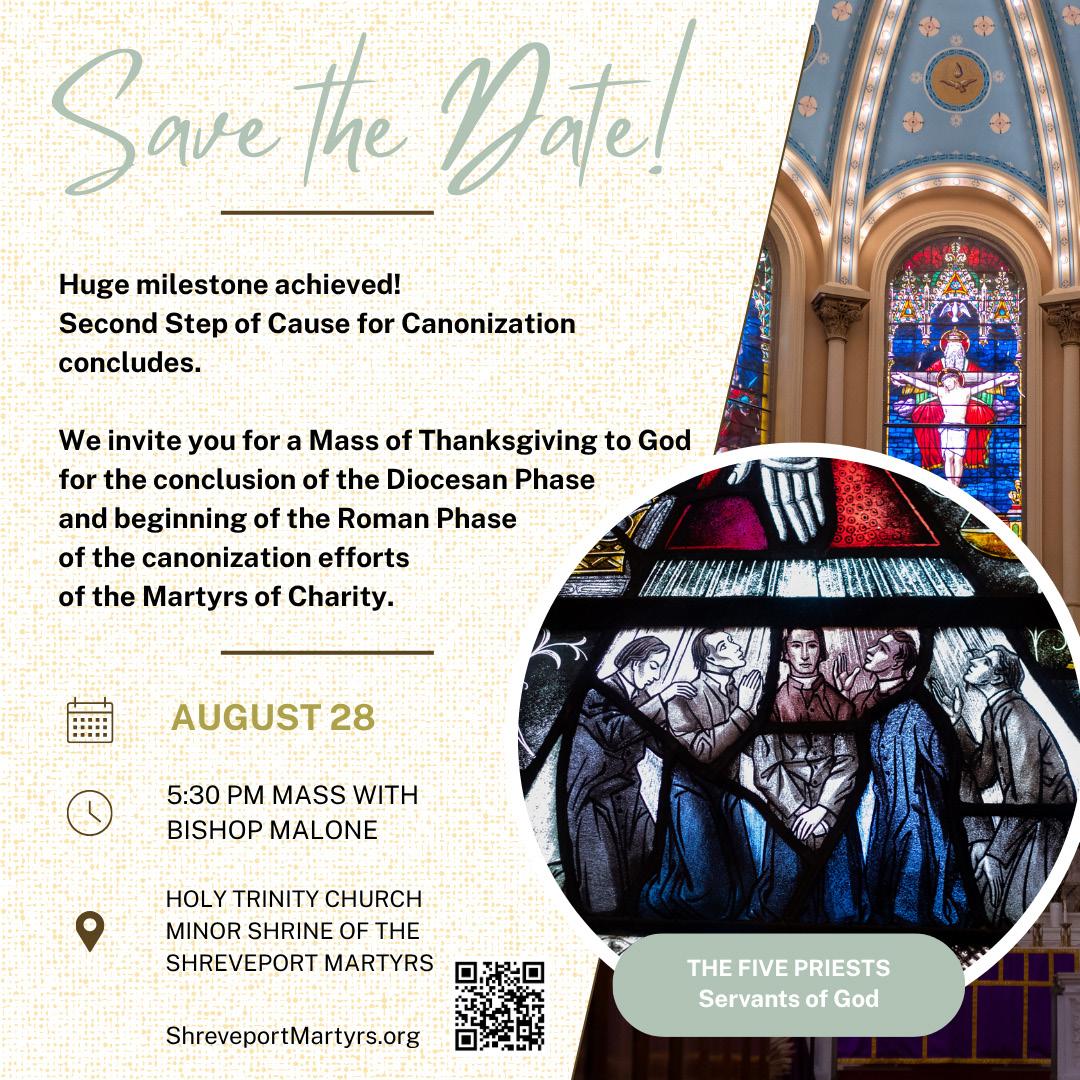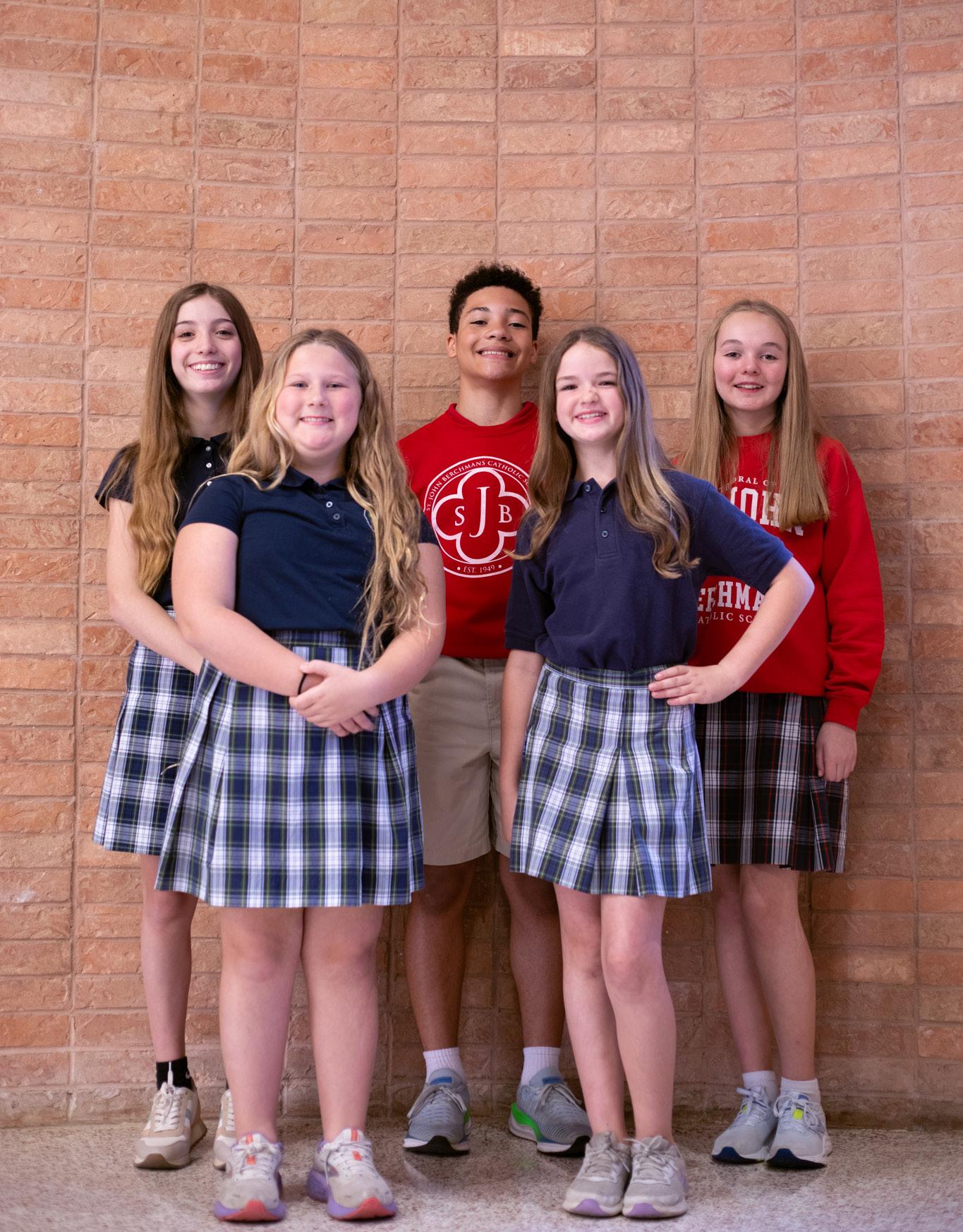

CATHOLIC CONNECTION
CATHOLIC CONNECTION
PUBLISHER
Bishop Francis I. Malone
EDITOR
Sophia Romanski
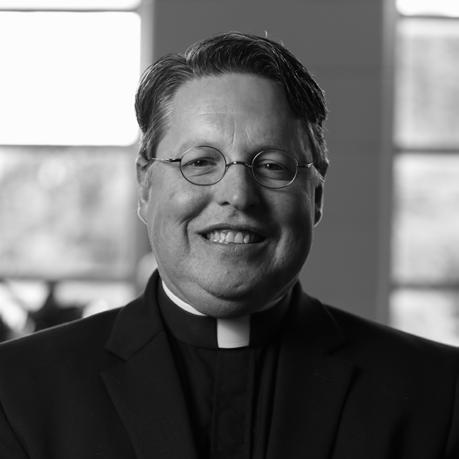
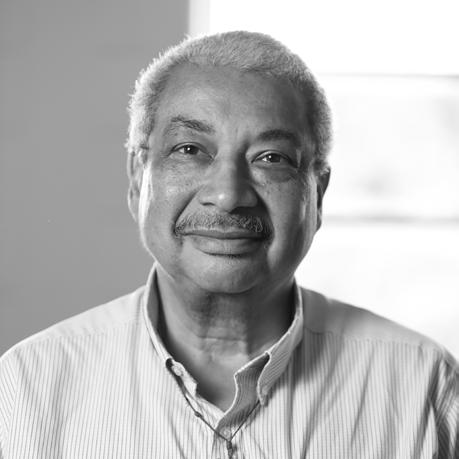
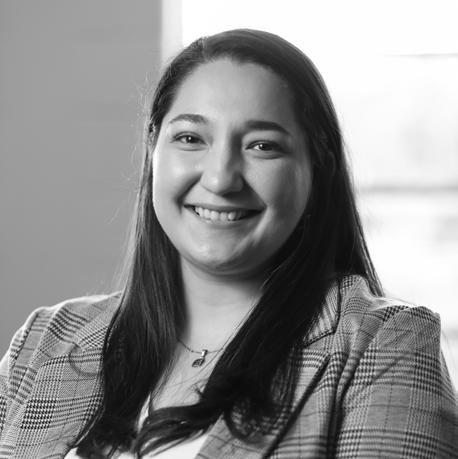

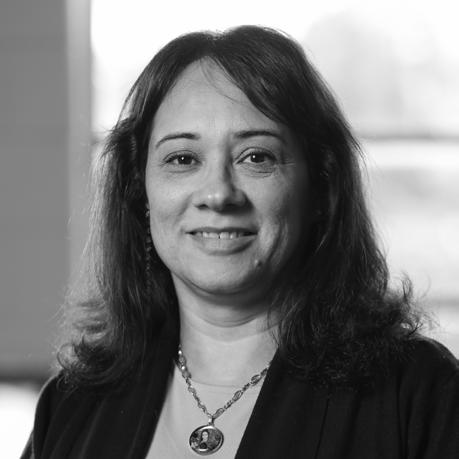
CONTRIBUTORS
Mary Arcement Alexander
Sr. Carol Cimino
Clayton Cobb
Karen Dill
Sarah Duncan
Tristan Frisk
Jordan Harris
Diane Libro
Lucy Medvec
Jennifer Nix
Very Rev. Msgr. Rothell
Price
Sarah Romanski
L'Anne Sciba
Sr. Carol Shively
Mary Ann Van Osdell
Mike Van Vranken
AUGUST 2025
Volume 35, Number 1 FORMING OUR FUTURE
Pope Leo XIV's Prayer Intention For The Month Of August
FOR MUTUAL COEXISTENCE Let us pray that societies where coexistence seems more difficult might not succumb to the temptation of confrontation for ethnic, political, religious, or ideological reasons.
Cover photo: Students from St. John Berchmans Cathedral School and St. Joseph Catholic School pose after delivering their Religion Fair presentations to Bishop Malone, March 21, 2025. Photo by Sophia Romanski
SUBSCRIPTIONS & ADDRESS CHANGES
Blanca Vice bvice@dioshpt.org
318-868-4441
SUBMISSIONS
Sophia Romanski sromanski@dioshpt.org
The Catholic Connection is a member of the Catholic Media Association.
The Diocese of Shreveport complies with Virtus’ Protecting God’s Children program (www.virtus.org). Online sessions are available. To report child sexual abuse by a cleric or church worker in the Diocese of Shreveport, call your local law enforcement agency and Mary Arcement Alexander, Diocesan Victim Assistance Coordinator at 318-588-2120. Thank you for helping to keep our children and vulnerable adults safe.
The Catholic Connection is funded in part by a grant from Catholic Home Missions and donations to the Catholic Service Appeal.
MISSION STATEMENT
The Catholic Connection is a monthly publication funded by your Catholic Service Appeal, mailed to every known Catholic household in the Diocese of Shreveport. Our mission is to advance knowledge and understanding of our Catholic faith among the faithful. We seek to foster the application of Christ’s teachings and our Church’s mission in our daily lives and to encourage our sense of Catholic identity within our family, parish, and faith community.
AUGUST SECOND COLLECTIONS
AUGUST 9 & 10 - OFFICE OF DIOCESAN MULTICULTURAL MINISTRIES supports the many communities in our diocese wherever we are needed—traveling to any parish that requests our help. We provide resources, formation, and support in whatever language is required. Our mission is to represent and uplift the many cultures that make up the Diocese of Shreveport, ensuring that everyone feels seen, heard, and spiritually nourished.
Very Rev. Msgr. Matthew T. Long
Dcn. Charles Thomas, OFS
Karla Alvarez
Rev. Kevin Mues
Rosalba Quiroz
Mass
in 2005;
of
Western Deanery Back to School Mass for Principals and Teachers; Cathedral of St. John Berchmans, Shreveport; 9:30 AM
we experience your presence in the sacraments. Bishop Malone's Calendar Special Events in the Diocese of Shreveport
Seminarians’ Mass; Saint Vincent Chapel, Shreveport; 11:30 AM
Eastern Deanery Back to School Mass for Principals and Teachers; Jesus the Good Shepherd Church, Monroe; 9:30 AM
of
Priest Retirement Committee Meeting; Catholic Center, Shreveport; 11:00 AM
Solemnity of the Assumption of the
The Assumption of the Blessed Virgin Mary Mass; Cathedral of St. John Berchmans, Shreveport; 8:15 AM
Fr. James McLelland’s 25th Anniversary of Ordination to the Priesthood Mass; Cathedral of St. John Berchmans, Shreveport; 4:00 PM
of the
Closing Session for the Cause for Canonization of The Five Priests; 5:30 pm at Holy Trinity Church, Shreveport
Help our priests to be strong in their vocation. Set their souls on fire with love for your people.
Grant them the wisdom, understanding, and strength they need to follow in the footsteps
Fidel Mondragón
Mallya
Charles Glorioso
Adrian Fischer, Fr. Patrick Madden
Mark Watson
Kevin Mues
Duane Trombetta
Makokha
Raney Johnson
Fr. Joseph Martina,
Feast of the Transfiguration of the Lord
Fr. Timothy Hurd, Fr. James Moran
Fr. Joseph Ampatt
Fr. LaVerne “Pike” Thomas
Fr. Keith Garvin
honoring Permanent Deacons Ordained
Cathedral
St. John Berhcmans, Shreveport; 5:30 PM
Fr. Peter Mangum
Memorial of St. Dominic, priest
Memorial of St. Claire, virgin
Memorial of St. Bernard, abbot and doctor of the Church
Memorial
Passion of St. John the Baptist
Memorial of St. Pius X, pope
Memorial
St. Alphonsus Liguori, bishop and doctor of the Church
Memorial of the Queenship of the Blessed Virgin Mary
Memorial of St. John Vianney, priest
Memorial of St. Augustine, bishop and doctor of the Church
Memorial of St. Monica
Blessed Virgin Mary
Memorial of St. Maximilian Kolbe, priest and martyr
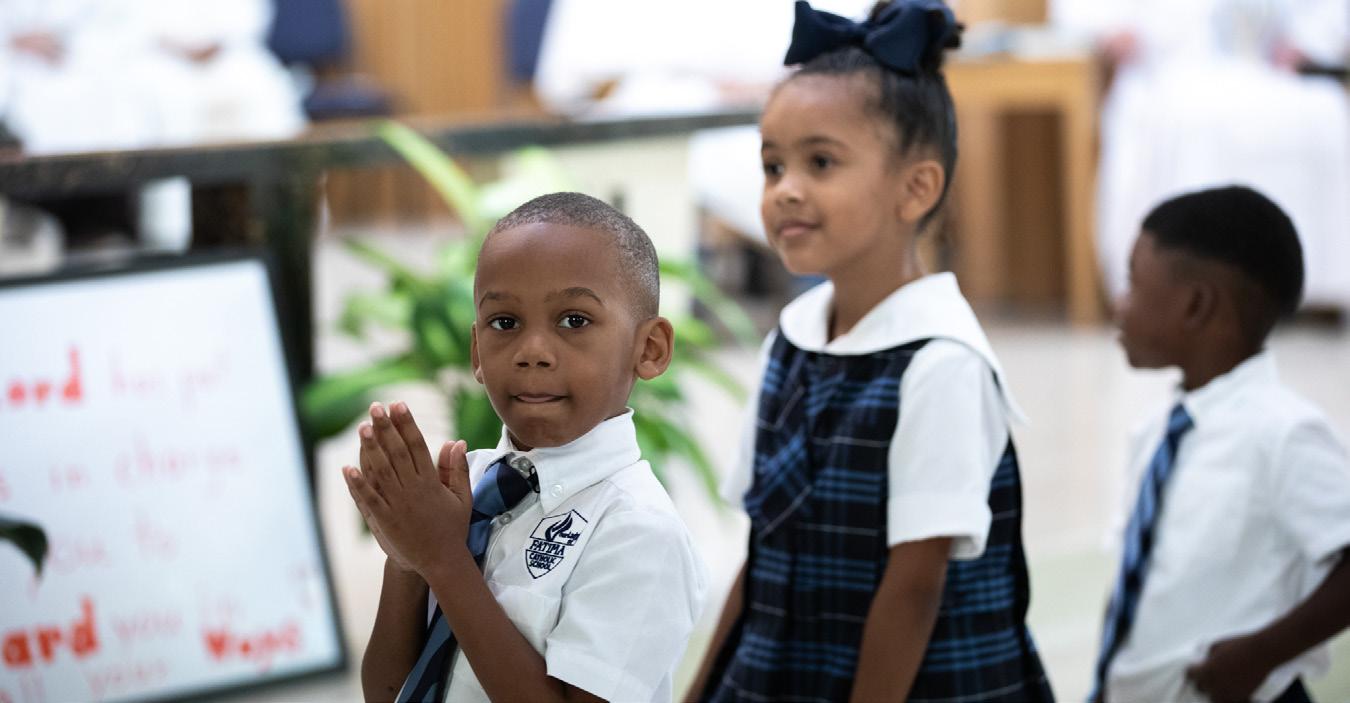

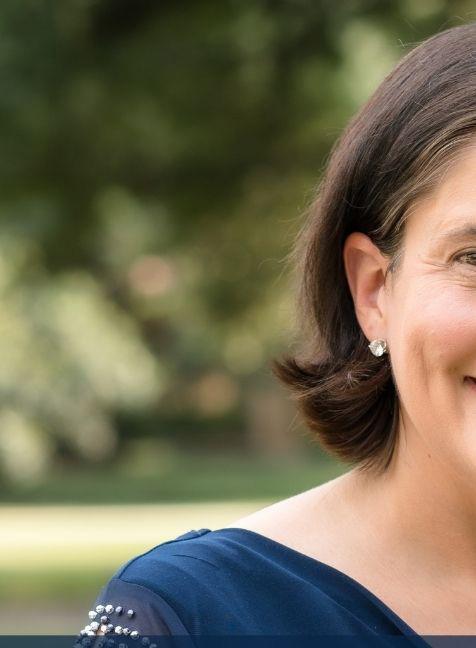

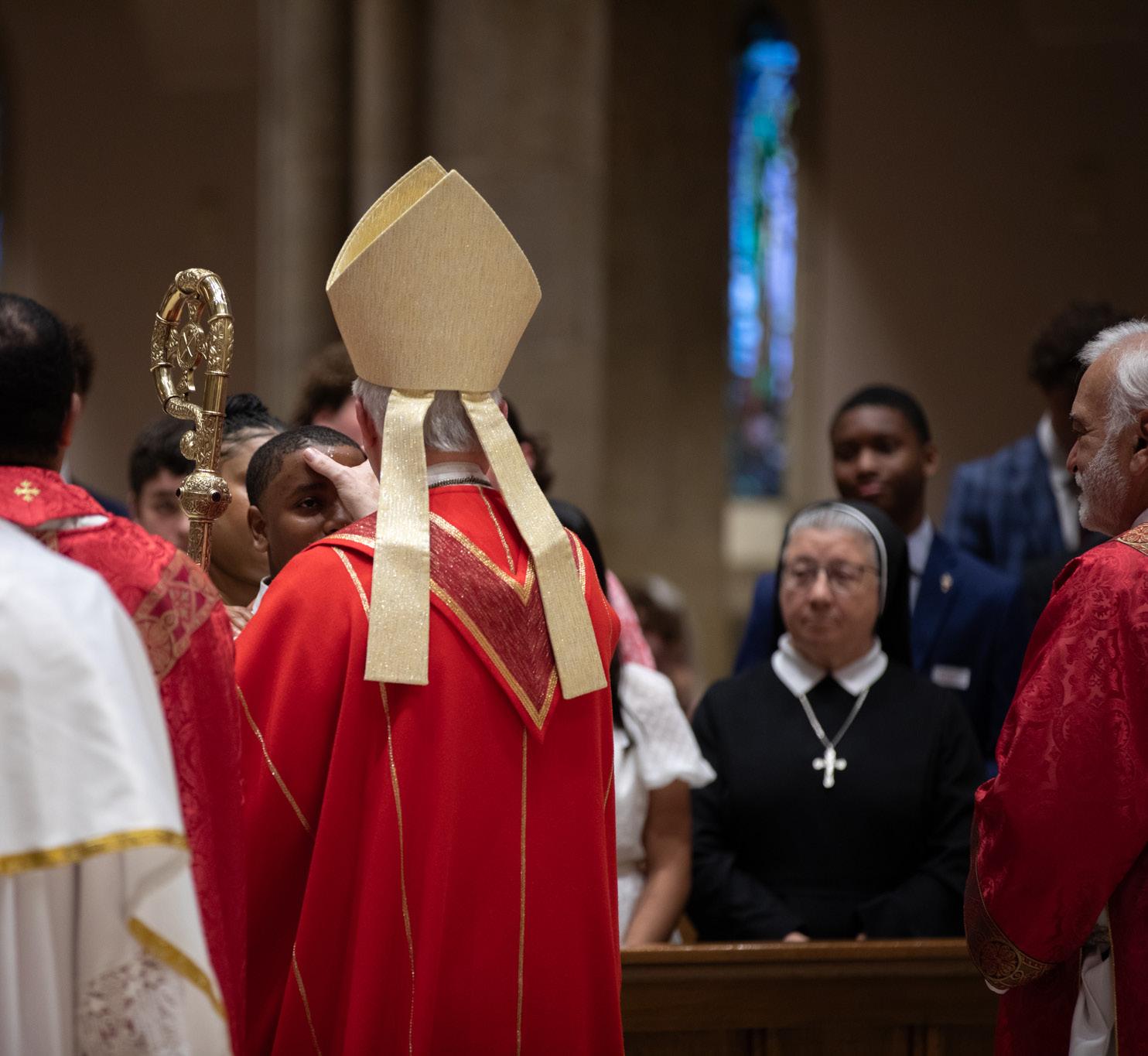
14 Religious Education: Forming Our Community in the Sacraments
Sarah Romanski, DRE at the Cathedral of St. John Berchmans, on the importance of sacramental formation.
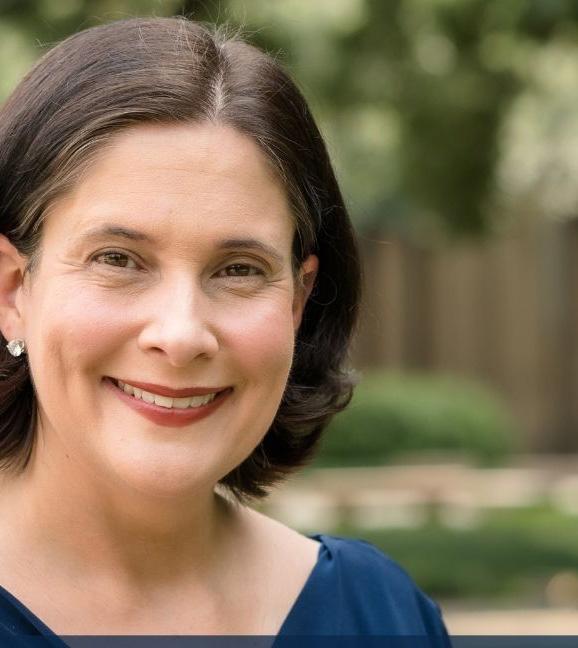
20 Meet Loyola's New Princpal! Dr. Laurie Salvail steps in to lead the next chapter heading into the 2025-2026 academic year.
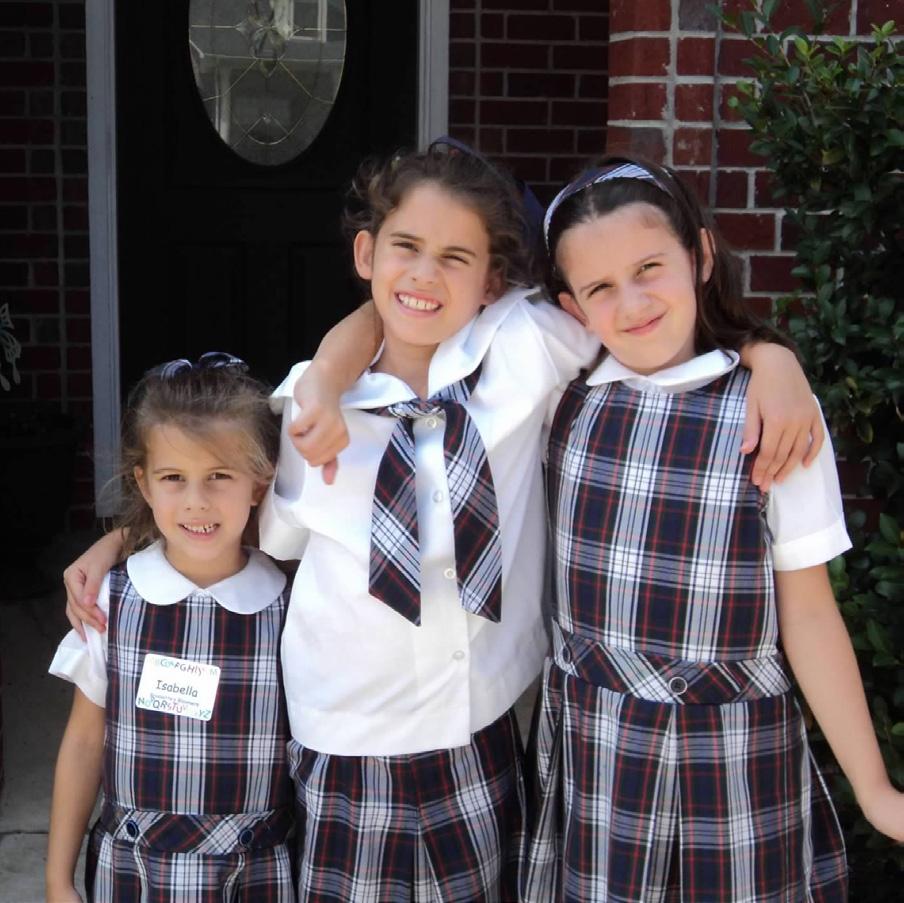
FROM THE EDITOR
Quality education has never been more critical. We live in an ever-shifting landscape defined by decreasing attention spans and increasing reliance on algorithms, tools, and technology. It is crucial to develop and maintain the skills to analyze, inspect, and critique the world around us, from the radio shows and podcasts we hear to the films and shows we watch to the books and articles we read. A good education, that is, an education that is solid, thorough, and wellrounded, is necessary not just for children, but for the adults who guide and form them.
The month of August has traditionally been the "Back to School" issue of the Catholic Connection
While it is a genuine joy to highlight the incredible work done in the Catholic schools of our diocese, I also want to take this space to emphasize the importance of education outside the classroom.
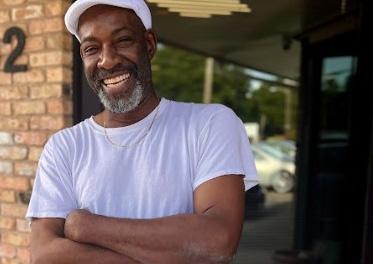
24 Catholic Charities Celebrates 15 Years of Service featuring Foster White, a graduate from the CCNLA Money School, pictured here.
The primary advantage of Catholic schooling is the "Catholic" part. Our faith places immense importance on human dignity, which in turn emphasizes the skills required to think critically about the world around us, challenge popularly held beliefs, and expand our horizons, all with love as the primary motivation for learning and growth. Our Catholic schools are built on this principle, but so is our entire community.
From Religious Education to OCIA to book clubs and lecture series, there are numerous opportunities to deepen our faith. It is our responsibility as disciples to continue our formation so that we may effectively guide our students and children along their journey.
Photo: the editor and her sisters, Isabella (left) and Cecilia (right), on the first day of school at SJB, 2011.
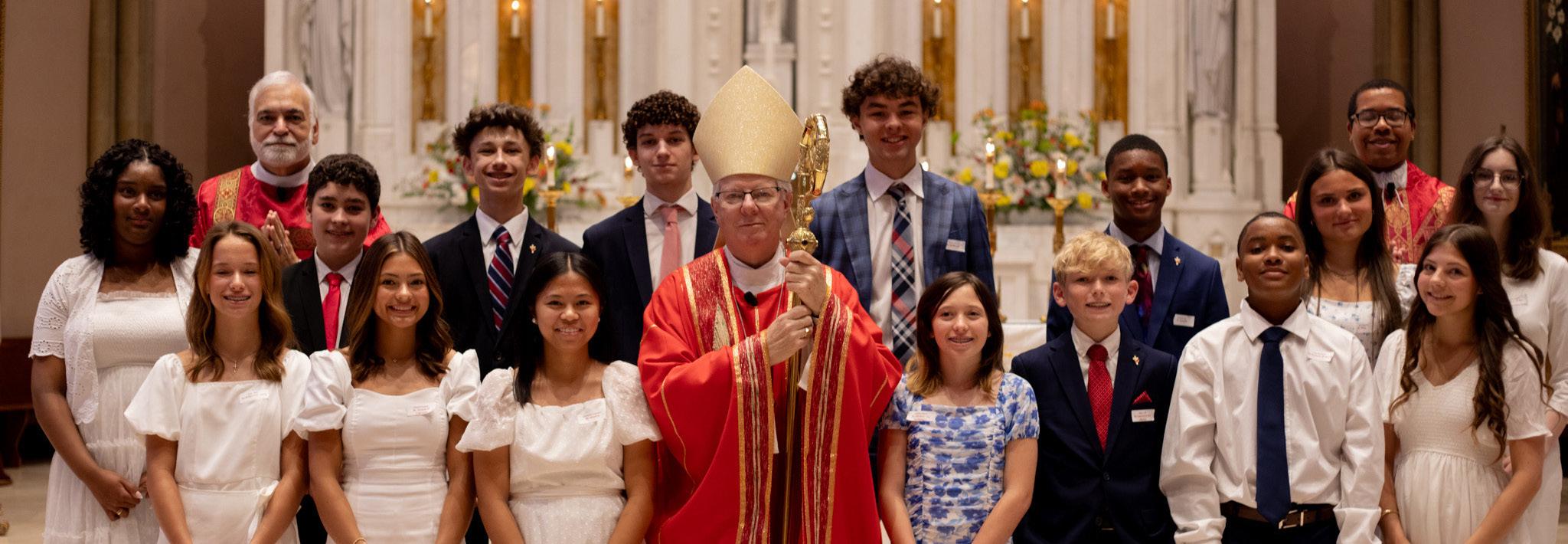
FROM THE BISHOP
Anew beginning!” That’s how I remember seeing this time of year as a child. I, my siblings, and all of my friends – found ourselves at the cusp of August anticipating the new school year. Our parents undertook the proximate preparation: brand new white shirt and uniformed pants, requisite marble copy book, newly sharpened pencil or two, and, for those of us more fortunate, a new, canvas book bag. As August days gave way to September, we sported new haircuts to look sharp for that first day. The familiar almost-mile walk to school, sitting empty the last few months, awaited the “first day” noises. Then came the children’s voices, the first graders’ cries when separated from parents for the first time, our teachers’ ominous looks, new faces, and new surroundings. It was September and a new beginning for each of us.
As we advanced from year to year, there were new lessons to learn, and we all advanced in religious study: new prayers, new devotions, and of course, a new Baltimore Catechism with more advanced questions and answers than the previous year. For those who don’t know (or remember) this history: the bishops of 19th century United States faced the daunting task of educating a growing and mixed immigrant population: Catholics by the hundreds of thousands. And so, they created a series of books on the Catholic faith, the “Baltimore Catechism.” Each book presented a series of questions and answers for students to memorize. Ask anyone of my vintage, and they can still recite much of it: “Why did God
make me? ... [To] know Him, to love Him, and to serve Him in this life so as to be with Him in the next.”
While our neighborhood in my day burst with Catholics of various ethnic backgrounds – Irish, German, Polish, Lithuanian, and Italian families – most of us attended Catholic schools, the “Catholic kids.” Those who attended public schools we simply called “publics.”
We were a generation or two beyond the catechism’s first introduction, when the tremendous growth of Catholic students prompted the construction of the Catholic School system in this country. The bishops had one goal for this Catholic School System: along with teaching the “3 R’s,” propagate the Catholic faith Thus, this time of year became a “new beginning” for Catholic students to learn more about our Catholic faith and in a little more depth; continuing through twelfth grade.
To be sure, a lot has changed since then, and the famous Catechism is rarely used (though it’s still beneficial). However, some new-school-year parish practices continue as before, be it for parishes with schools or parishes without schools but offering schools of religion for the “publics,” now called “PSR” (Parish Schools of Religion). The annual OCIA (Order of Catholic Initiation of Adults) program begins at most or all parishes. Its members attend weekly sessions in anticipation of becoming Catholic months later at Easter – definitely a new beginning for them! Our first and second graders begin sacramental preparation, anticipating
their first reception of the Sacraments of Reconciliation and Communion. Junior High students advance in their preparation for the Sacrament of Confirmation, usually received at age 14. When I visit parishes throughout the diocese each year, it is easy to see their growth in understanding the faith. And some eventually participate in adult forms of education, like Scripture Study.
Of course, growing in faith is about more than knowledge. It’s also about how to live one’s faith – to become an example of what it means to be Catholic. It’s about how important it is to continue the prayers we learned years ago and how attending Mass every Sunday keeps us grounded and centered in the Eucharist. And it’s about how the living of our faith as a regular part of life strengthens us to deal with all the challenges that come our way. As August gives way to September, the change should remind us of our need to grow in the awareness of who we are and what the Lord expects us to become.
The theme of a movie I watched as a child, “It happens every Spring,” was that with the coming of Spring each year, so comes baseball. Similarly, in the Church at this time of year, renewed study of our faith comes again, both in newer forms and with growth in knowing who we are and what we believe… “it happens every Fall.” A new beginning for sure!


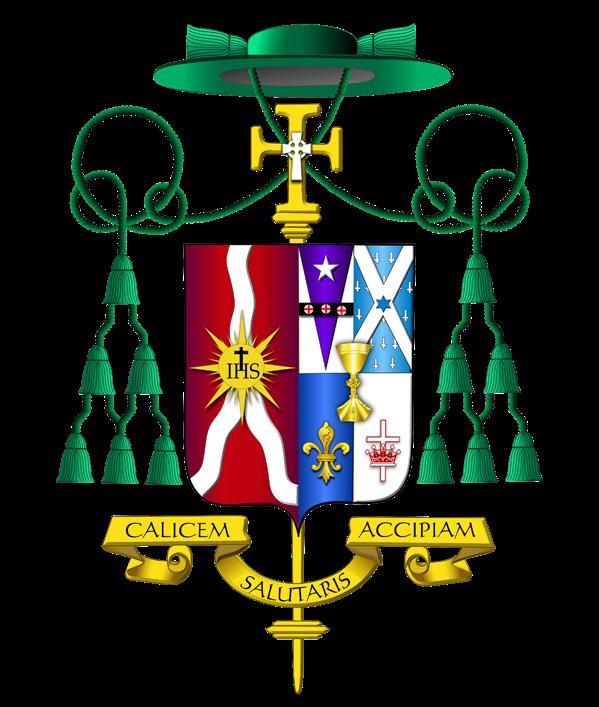
por el obispo
Un nuevo comienzo!” Así es como recuerdo esta época del año cuando era niño. Mis hermanos, mis amigos y yo nos encontrábamos al borde de agosto, anticipando el nuevo año escolar. Nuestros padres se encargaban de la preparación inmediata: una camisa blanca nueva y pantalones del uniforme, el cuaderno de mármol obligatorio, uno o dos lápices recién afilados y, para los más afortunados, una nueva mochila de lona. A medida que los días de agosto daban paso a septiembre, estrenábamos nuevos cortes de cabello para lucir bien el primer día. El conocido camino de casi una milla hasta la escuela, que había estado vacío durante los últimos meses, esperaba los ruidos del “primer día.” Y luego llegaban las voces de los niños, los llantos de los de primer grado al separarse por primera vez de sus padres, las miradas serias de los maestros, caras nuevas… y todo lo nuevo. Era septiembre y un nuevo comienzo para cada uno de nosotros.
A medida que avanzábamos de grado en grado, había nuevas lecciones por aprender, y también progresábamos en nuestra formación religiosa: nuevas oraciones, nuevas devociones y, por supuesto, un nuevo Catecismo de Baltimore con preguntas y respuestas más avanzadas que el año anterior. Para quienes no conocen (o no recuerdan) esta historia: los obispos de Estados Unidos del siglo XIX enfrentaron la enorme tarea de educar a una población inmigrante creciente y diversa: cientos de miles de católicos. Por eso, crearon
una serie de libros sobre la fe católica, el “Catecismo de Baltimore.” Cada libro presentaba una serie de preguntas y respuestas que los estudiantes debían memorizar. Pregúntele a cualquiera de mi época, y todavía puede recitar gran parte: “¿Por qué me creó Dios?... [Para] conocerlo, amarlo y servirlo en esta vida y así estar con Él en la próxima.”
En mi época, nuestro vecindario estaba lleno de católicos de distintos orígenes étnicos —familias irlandesas, alemanas, polacas, lituanas e italianas— y la mayoría de nosotros asistía a escuelas católicas, éramos los “niños católicos.” A quienes asistían a escuelas públicas simplemente los llamábamos “los públicos.”
Éramos una o dos generaciones después de la introducción del catecismo, en un tiempo en que el enorme crecimiento de estudiantes católicos impulsó la construcción del sistema escolar católico en este país. Los obispos tenían un objetivo para este sistema escolar: junto con enseñar las “3 R” (lectura, escritura y aritmética), propagar la fe católica. Así, esta época del año se convertía en un “nuevo comienzo” para que los estudiantes católicos aprendieran más sobre su fe, y con mayor profundidad, continuando hasta el duodécimo grado.
Por supuesto, muchas cosas han cambiado desde entonces, y el famoso catecismo ya casi no se utiliza (aunque sigue siendo muy útil). Sin embargo, algunas prácticas parroquiales de inicio de año escolar continúan como antes, ya sea en parroquias con escuela o en parroquias sin escuela pero que ofrecen catequesis para “los públicos,” ahora llamados “PSR” (Escuelas Parroquiales de Religión). También inicia el programa anual de OCIA (Orden de Iniciación Cristiana para Adultos) en la mayoría de las parroquias. Sus miembros asisten a sesiones semanales con la esperanza de convertirse en católicos meses después, en la Pascua —¡definitivamente un nuevo comienzo para ellos! Nuestros niños de primero y segundo grado comienzan la
preparación sacramental, anticipando su primera Reconciliación y Comunión. Los estudiantes de secundaria continúan su preparación para el Sacramento de la Confirmación, que usualmente se recibe a los 14 años. Cuando visito parroquias por toda la diócesis cada año, es fácil ver su crecimiento en la comprensión de la fe. Y algunos eventualmente participan en formas de formación para adultos, como el Estudio Bíblico.
Por supuesto, crecer en la fe no se trata solo de conocimiento. También se trata de cómo vivir nuestra fe —ser un ejemplo de lo que significa ser católico. Se trata de la importancia de continuar con las oraciones que aprendimos hace años y cómo asistir a Misa cada domingo nos mantiene firmes y centrados en la Eucaristía. Y se trata de cómo vivir nuestra fe como parte regular de la vida nos fortalece para enfrentar los desafíos que se nos presentan. A medida que agosto da paso a septiembre, este cambio debería recordarnos nuestra necesidad de crecer en la conciencia de quiénes somos y lo que el Señor espera que lleguemos a ser.
La temática de una película que vi cuando era niño, “Sucede cada primavera,” era que con la llegada de la primavera cada año, también llegaba el béisbol. De forma parecida, en la Iglesia, en esta época del año, el estudio renovado de nuestra fe vuelve una vez más, con formas nuevas y con un crecimiento en el conocimiento de quiénes somos y en lo que creemos… “sucede cada otoño.” ¡Un nuevo comienzo, sin duda!

Para obtener más información sobre las oportunidades del Ministerio Multicultural en la Diócesis de Shreveport y para encontrar nuestros horarios y lugares de misa en español, por favor escanee el código aquí.

The Courage to Trust
Cultivating a Culture of Hope in a Chaotic World
Ayoung man who is a resident at Hope Connections shelter rushes to open the door for others and always stop to help those outside the building who ask for a cup of coffee or snack. If he has it, he gives it. When he sees things that need to be done, he is among the first to volunteer. While he struggles with goal setting and recently lost two jobs, he remains steadfastly kind to others.
The other day, he picked at a bump on his finger and hours later his finger swelled beyond recognition. After multiple visits to the ER, he was admitted for a severe infection.
The next day, he called to ask if someone could bring him his clothes and a few snacks from his locker. Opening his drawer revealed only two pairs of underwear, one shirt, a pair of socks, and a pair of dress pants I had seen him wear to countless job interviews. “Hmm… his clothes must be in the chest under his bed,” I thought. But the chest was completely empty. Looking all around his sleeping area, I found only his blanket, pillow, a radio, and a skateboard. Then, I remembered his locker in the common area.
Earlier on the phone, he entrusted me with the locker’s combination. Opening the metal door, I found inside two bags of chips, canned tuna, and microwave noodles. Grabbing the chips for his snack, I closed the
door, shocked that there were no other possessions. I had just rummaged through everything he owned that he wasn’t already wearing, and it could fit in a grocery sack.
This was all that belonged to the generous young man who never asked for a donation and always made sure others got what they needed when items were distributed among the residents.
A resident friend of his helped me search through donations for what might fit him, and we stuffed all we could find in a backpack with his snacks, then his friend headed off to deliver them.
Hours later, the young man called from the hospital to thank me and shared that he had had surgery. When I asked how it went, he replied, “Miss Jennifer, you know… I think it went okay. I didn’t like how the doctors tried to take my wallet when they wanted to give me medicine to go to sleep. I’ve had plenty of stuff stolen and I wasn’t about to trust a stranger with my wallet. I had to talk them into doing the cutting without putting me to sleep. They just gave me some medicine. I didn’t feel too much, but it did kind of hurt when they were cutting. They didn’t want me to look, but it sketched me out to have my face covered. I just don’t like not knowing what’s going to happen to me.”
This young man... well really, just a boy in so many ways, could carry everything he owned in a backpack. His wallet, although not stuffed with money, was a precious rare commodity for him, a means of identity and survival. He risked the pain rather than trust the doctors. I realized that even though he had been at the shelter for months, he remained in survival mode. But his was not an animalistic, cutthroat survival. He still had an innocence and a kindness. His heart wasn’t hardened. Still, he knew he had to protect himself.
It reminded me of how blessed I am that he, and other residents like him, are willing to trust me to care for them – even to go through their small, yet precious possessions! It is a gift to be trusted and allowed to share and care with the residents. I am so blessed for the opportunity to love each and every one of these people. And I am even more abundantly blessed to witness their many shining examples of love without expectation of anything in return. Sure, everyone isn’t like the young man described here, but they all have undeniable value as beloved children of God. It is our responsibility to not only show them love, but help them feel the dignity they need to truly love themselves.
Mother Teresa of Calcutta said, “Find your own Calcutta. Find the sick, the suffering and the lonely right there where you are.” And I’m telling you,
it is true. You don’t have to search far to find a community greatly in need of protection and love. I also tell you that when you find your place to serve, you will experience love freely given, even among chaos and fear. Truly, our Calcutta is right here in Shreveport. In the midst of our own Calcutta, I enter the doors of Hope Connections – never knowing what awaits me but knowing that I am daily given an opportunity to prayerfully embrace beautiful souls that have been marginalized for so many different excuses. Everyone, and I mean everyone – no exception – deserves the basic human right to a safe place to sleep without fearing what will happen when they close their eyes.
The Role of Human Formation
"The whole work of priestly formation would be deprived of its necessary foundation if it lacked a suitable human formation."
- Pope St. John Paul II, Pastores Dabo Vobis (43)
In the world of seminary formation, there are four dimensions or pillars: the spiritual, human, apostolic or pastoral, and intellectual. It’s a common belief that the spiritual dimension is the foundation for formation as a whole. After all, without the spiritual life there is no prayer, charity, and sacrifice. But the fact is that formation’s actual foundation is the human dimension, as stated by Pope John Paull II in his Post-Synodal Apostolic Exhortation Pastores Dabo Vobis (I Will Give You Shepherds): "The whole work of priestly formation would be deprived of its necessary foundation if it lacked a suitable human formation” (43).
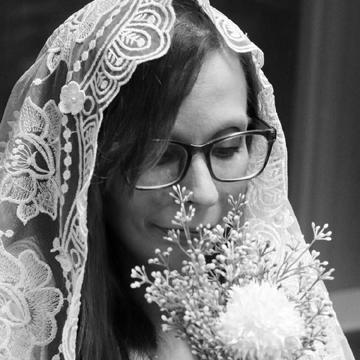
Jennifer Nix is a parishioner and catechist at St. Elizabeth Ann Seton Catholic Church in Shreveport and the Day Service Coordinator at Hope Connections.
All seminarians are directed to focus on this during our formation. It is key that we be like Jesus Christ, who, in His humanity, was able to relate and communicate God’s Love to all humanity, as He was like us in every way “but sin” (cf. Hebrews 4:15). However, this foundation does not belong exclusively to the priesthood but rather to all the baptized. Because Jesus Christ came down from Heaven and became a human, all baptized humans are to have human formation as their foundation.
We can grow in this dimension through many means, but growing
in self-knowledge is important for everyone. This is the first step for human formation because it not only identifies a person’s character, gifts, strengths, and weaknesses, it most importantly reveals how these naturally play into a person's ability to relate to one another and recognize who they are in relation to one another.
A seemingly forgotten truth is that every human person does not survive, thrive, or love alone; we only exist and can be fulfilled through relationship. Yes, we only come to know ourselves relationally, not individually. This selfknowledge helps us grow deeper in our humanity and realize our identity, who we are, in relation to God and in relation to one another. And this truth is what Jesus Christ came to bring us when, in coming down from Heaven, He became a human.

Tristan Frisk is a seminarian for the Diocese of Shreveport.
The Challenge of Formation
Ireceived my bachelor’s degree in secondary education in 1972, and embraced the vocation of teaching high school English. If that sounds easy, you never stood before a room filled with bored, distracted, malleablebrained adolescents while trying to help them speak and write the king’s English correctly – as well as appreciate the beauty and depths of prose, drama, and poetry. After a few years of this, I accepted a job offer teaching religion classes at Loyola College Prep. The stakes there were higher…
Teaching in a Catholic school is not just a job; it’s a mission. Whether or not they realized it, my students wrestled with God as their lives unfolded. My curriculum was an overview of the Old and New Testaments, but my task involved much more than just imparting subject matter. I was also part of a team invested in forming students to become moral adults who could make significant contributions to their future communities. Thus, I sincerely tried to enter their struggles with them as we studied and discussed the scripture lessons.
Our students were a mixed bag of spirituality: cradle Catholics; Protestants; “nones,” as the common vernacular refers to the unchurched; Muslims; Jews; agnostics; and professed atheists. I wasn’t out to convert anyone to Catholicism – that was up to the Holy Spirit! I simply wanted to impart a fundamental understanding of the Bible. More importantly, I wanted to help mold them into “men and women for others,” as St. Ignatius did when instructing his Jesuit priests. I’ve often wondered how much they absorbed. How much stuck with them when they moved on from Loyola into the realm of adulthood?
A few days ago, I noticed in the 2002 yearbook a letter to the editor written by a favorite student. Describing his experiences at Loyola as a non-Catholic student, he said he initially expected “they would try to convert students of a different religion or try and stuff Catholic ideas down
people’s throats,” but that “nothing could be further from the truth.” He praised his four years of Catholic education as a major contribution to his becoming a mature person ready to go out into the real world. His conclusion: “With so many different people from different backgrounds and different beliefs, Loyola became a small microcosm of the world. I credit the complete education of Loyola with my success. Had I attended [any other] school, I doubt that my abilities would be anywhere near where they are now.” His words affirm my belief that Loyola is a catholic school in the true sense of the word – universal, all-embracing.
For me, his letter seemed to be God’s pat on the back. I know I didn’t do a perfect job during my 13-year tenure, but He knows I gave my best effort to share the faith with all my students while striving to help them become the best versions of themselves. And not only did I contribute to their formation, they contributed to mine. Challenging students brought me to my knees in prayer, asking for the graces to help them grow. The students, faculty, and parents all showed me faces of Jesus that inspired my growth closer to Him – and continues daily as a retiree. Now, I pray for the continued success of that school and all those I encountered there.
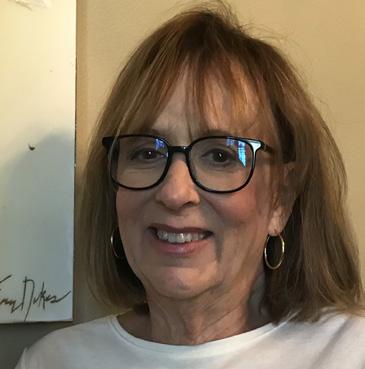
Karen Dill is a spiritual director for the Diocese of Shreveport and a parishioner at St. Elizabeth Ann Seton.
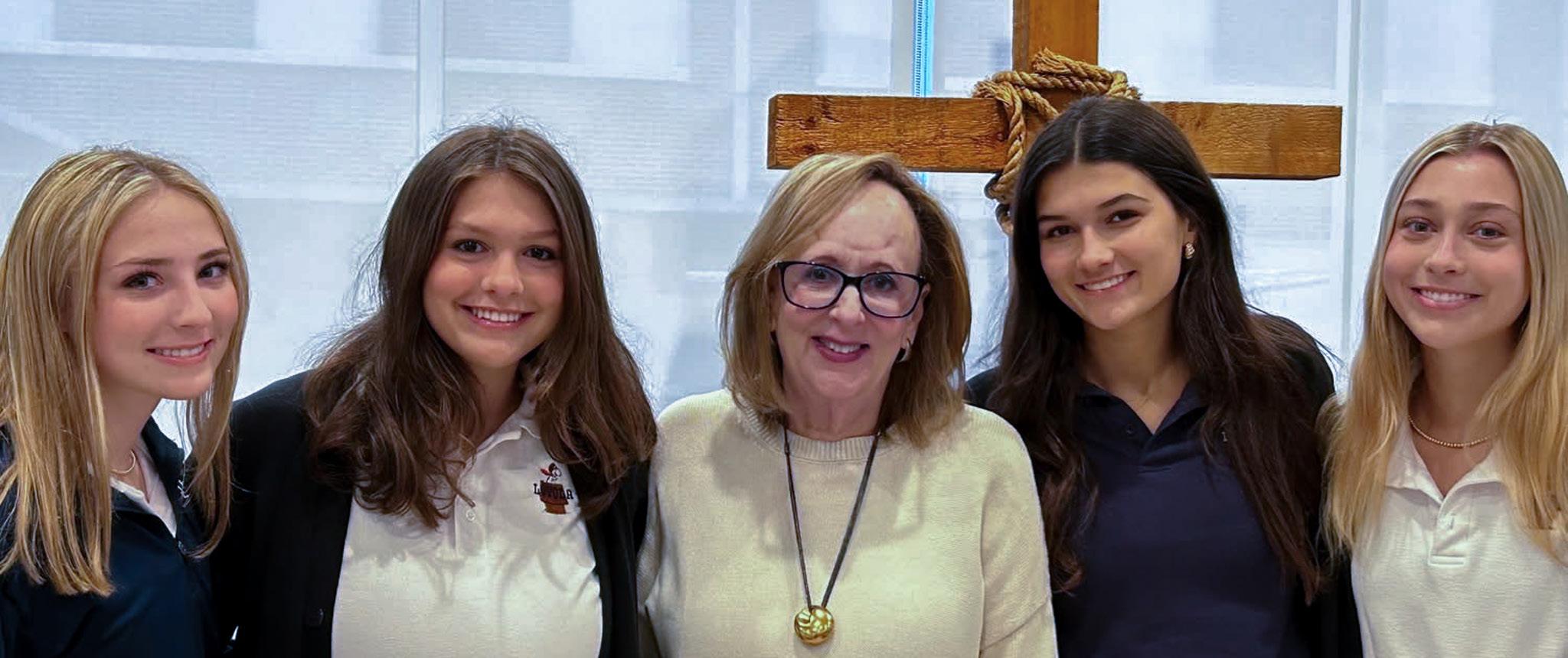
Forming Our Future Through Faith
Our theme for the 2025 Catholic Service Appeal is “Building Our Faith.” Throughout the year we have highlighted the various ministries in the Diocese of Shreveport that are funded by your donation and how those ministries grow our spiritual life and, indeed, build our faith.
This month’s theme for the Catholic Connection (also solely funded by the Catholic Service Appeal) is “Forming Our Future.” Some ministries funded by your financial support work every day to build our faith’s future, particularly in the areas of Catholic Education, Youth Ministry, Campus Ministry, and Seminarian Education.
Catholic Education – The Catholic Service Appeal provides funds for tuition assistance for students attending our Catholic schools and for professional development of their faculty and staff.
Youth Ministry – Gifts to the Appeal help fund youth summer camps, the annual Diocesan Youth Summit, and training and resources for parish youth ministers.
Campus Ministry – Our college campus ministries are thriving, which can be attributed to support from the Catholic Service Appeal. This year, FOCUS missionaries will be at Louisiana Tech and University of Louisiana – Monroe to lead bible studies, spiritual retreats, weekly study sessions, and other activities that create a spiritual home for our college students.
Seminarian Education – This is the big one – both figuratively and in reality. The Catholic Service Appeal is the primary source of funding for our seminarians’ education and formation. At over $50,000 annually per seminarian, this cost is a major part of the Catholic Service Appeal budget. These young men will truly be the future of our faith – they are our future priests! If you want to have priests, then you need to donate to the Catholic Service Appeal. It is just that simple.
It's easy to give to the Catholic Service Appeal and every gift of any amount can make a difference. You can give online at www.dioshpt.org or scan the QR code.
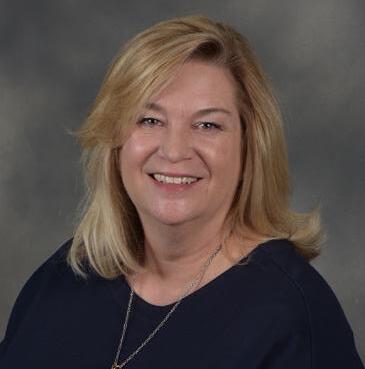
Lucy Medvec is the Director of Development and Stewardship for the Diocese of Shreveport.
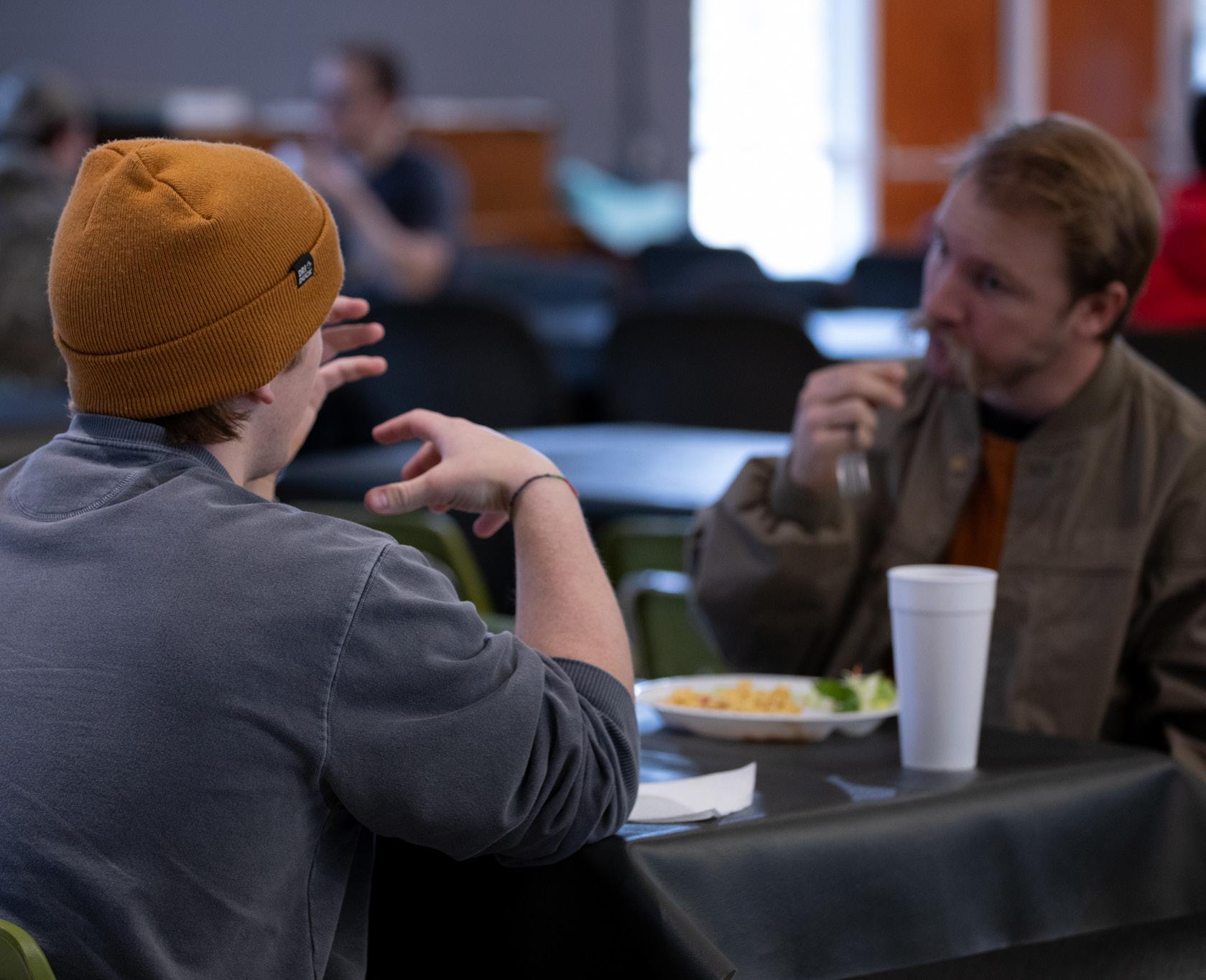
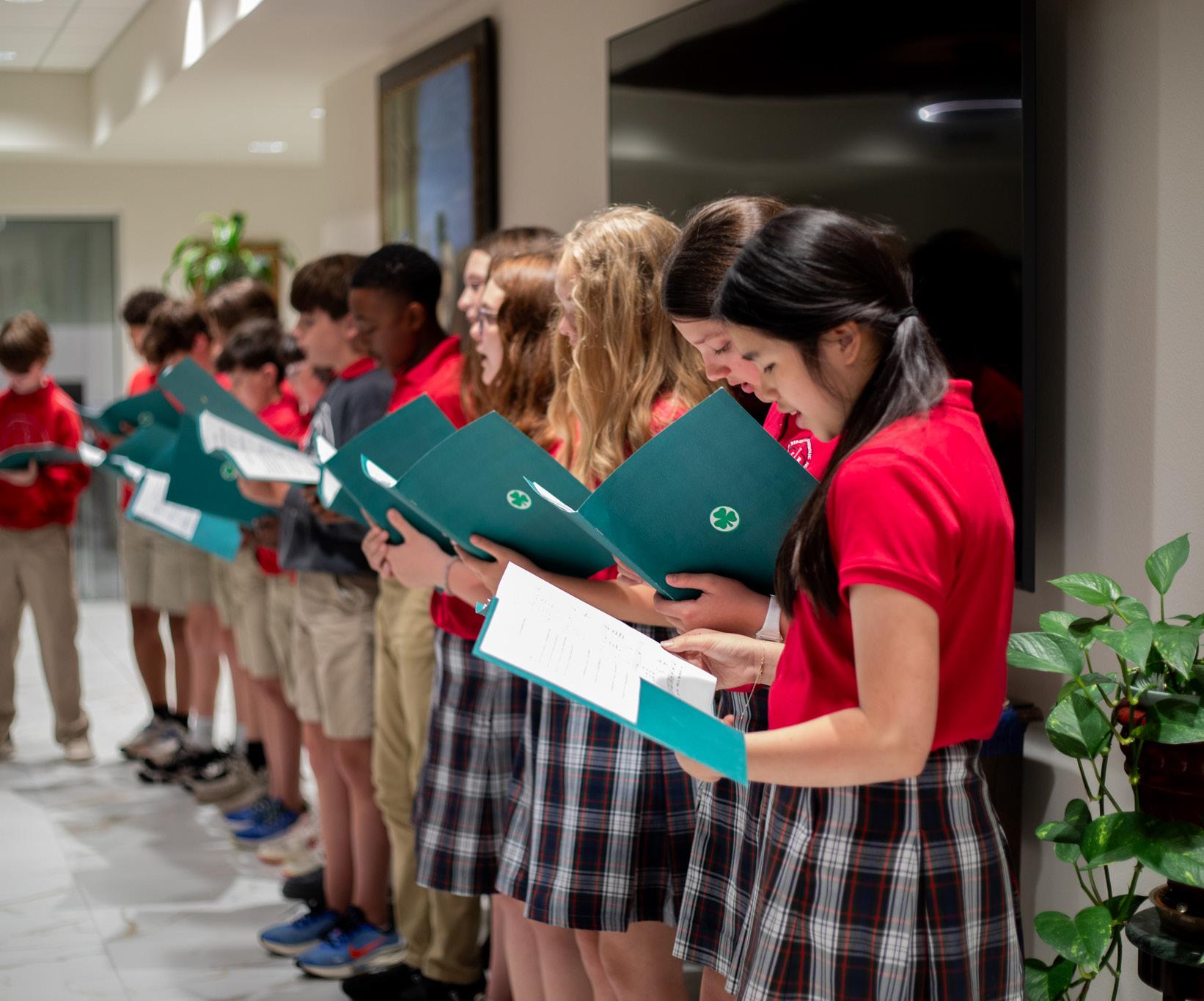

Scan here to donate to the Catholic Service Appeal today!
Students at Louisiana Tech University in Ruston enjoy $1 spaghetti dinners provided by the Catholic Campus Ministry.
St. John Berchmans Cathedral School 6th grade chior performing at the Catholic Center to celebrate the 48th Anniversary of Bishop Malone's ordination to the priesthood.

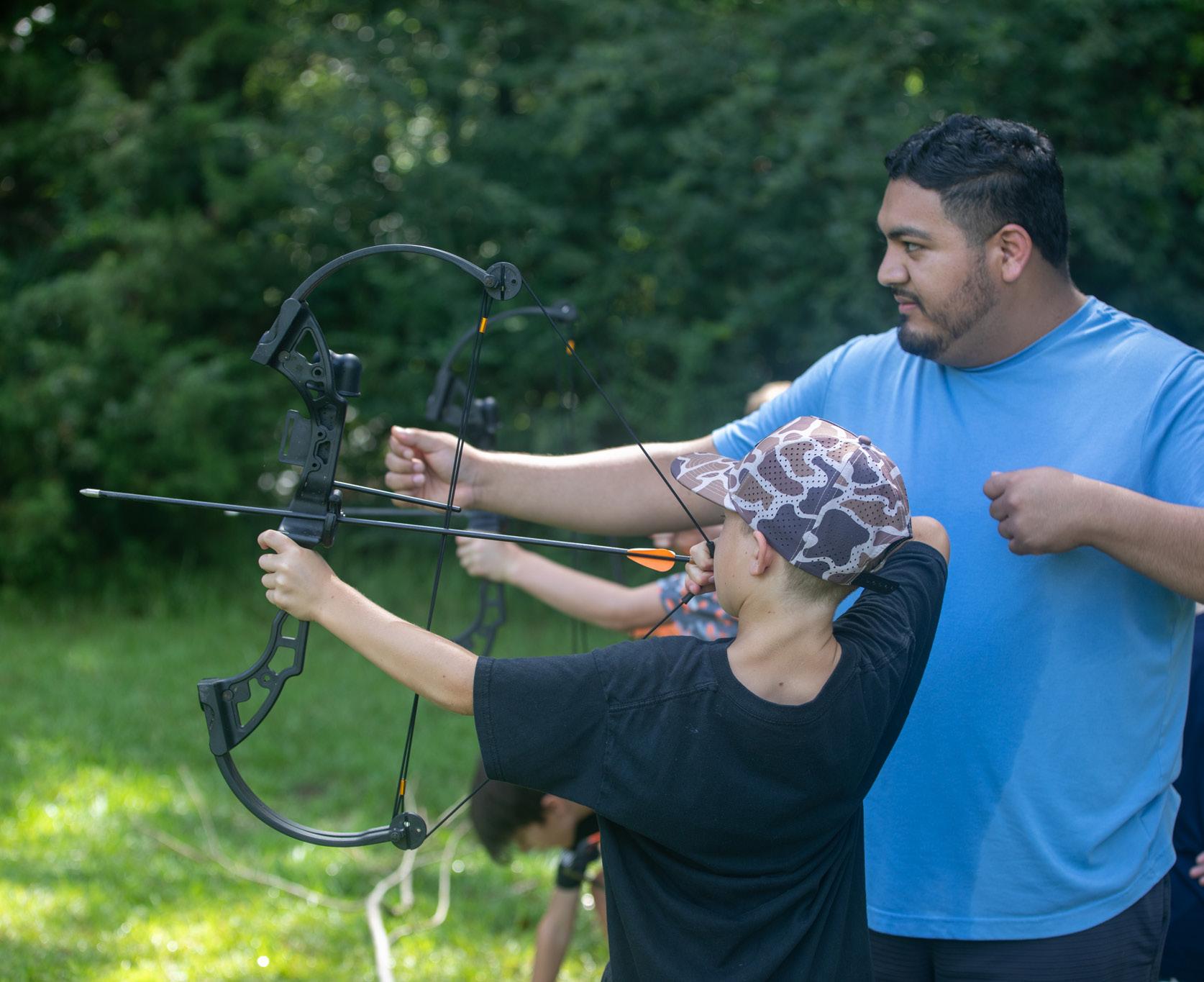

Camp Little
“He that is a little one, let him turn to me.”
Proverbs 9:16

Camp Little Flower is proudly sponsored by the Catholic Service Appeal. Scan here to donate today!
Little Flower 2025

From June 23-27, children from across the Diocese of Shreveport gathered at Scottsville Camp near Marshall, Texas, for an amazing week of fun, faith, good food, games, and songs. Running its third consecutive year, Camp Little Flower hosted approximately 90 campers, ages eight to thirteen. It followed the traditional summer camp model, including the following activities: archery, canoeing, swimming, hiking, faith, art, team-building, and nightly campfire skits and songs. On the spiritual side, campers prayed a decade of the Rosary, attended daily Mass, and participated in a Eucharistic procession near the Feast of Corpus Christi and a Marian procession two nights later. During daily rotations, children learned about Blessed Carlo Acutis and discussed Eucharistic miracles listed on the website he designed. On Thursday, Wild World from Marshall, Texas, visited the younger campers, bringing special animals to remind the children of the beauty and care of God’s creatures. Camp groups competed on the last day in a Sacred Heart of Jesus art poster competition and a faith skit showcase.
A special thanks goes out to all adult counselors and activity leaders for an outstanding job, particularly through showing love in “little ways” like our camp patroness, St. Therese of Lisieux. Let us all imitate her and all the great saints to grow in virtue!
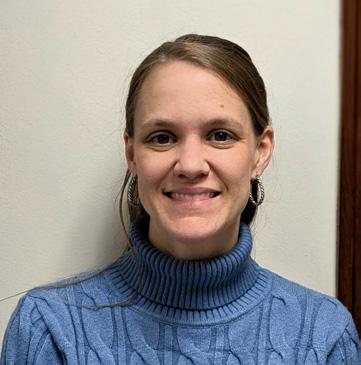
Elise Reis is the Math and 7th grade Social Studies teacher at Our Lady of Fatima Catholic School in Monroe, LA.
An Open Letter to the Diocese of Shreveport
Please join in supporting our 2025 Diocese of Shreveport Service Appeal, if you have not yet already done so. To all of you who have, thank you. Thank you, for being an evangelist proclaiming the Good News with your financial and spiritual gift. Thank you, for being a saint, a friend of Jesus, supporting Him from your pocket and your heart. Thank you, for building up the kingdom with the practicality of your money and the encouragement of your spiritual charity.
I encourage everyone in our diocese to make either a onetime donation or pledge to complete over time for the annual appeal. Reaching our financial goal is important, but reaching 100% participation among God’s household members is even more important. We greatly desire that every Catholic and non-Catholic person of good will participate in supporting the appeal’s ministries and services. The appeal’s benefits touch every deanery and region of our diocese, every church community in our diocese, and tens of thousands of Catholic and non-Catholic men, women, and children who truly need to experience the presence of Jesus and His Church in their time of spiritual, emotional, or material need. The appeal is about being the heart, hands, feet, and face of Jesus in an effective and impactful way. It is about developing and sustaining people in various ministries. It is about making programs, formation, and fellowship possible for many when no one parish or program could accomplish the work alone.
If you have not yet given to the 2025 Service Appeal, please do so sooner rather than later. Hearts and souls will be uplifted, and the Church’s mission and witness will be strengthened by your prompt participation.
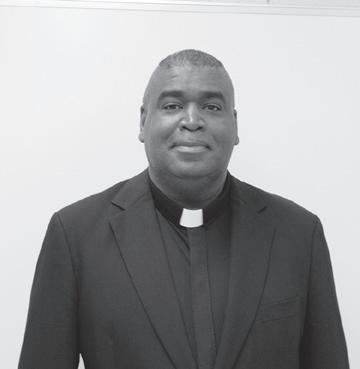
Very Rev. Msgr. Rothell Price is the pastor of St. Elizabeth Ann Seton Catholic Church in Shreveport, LA
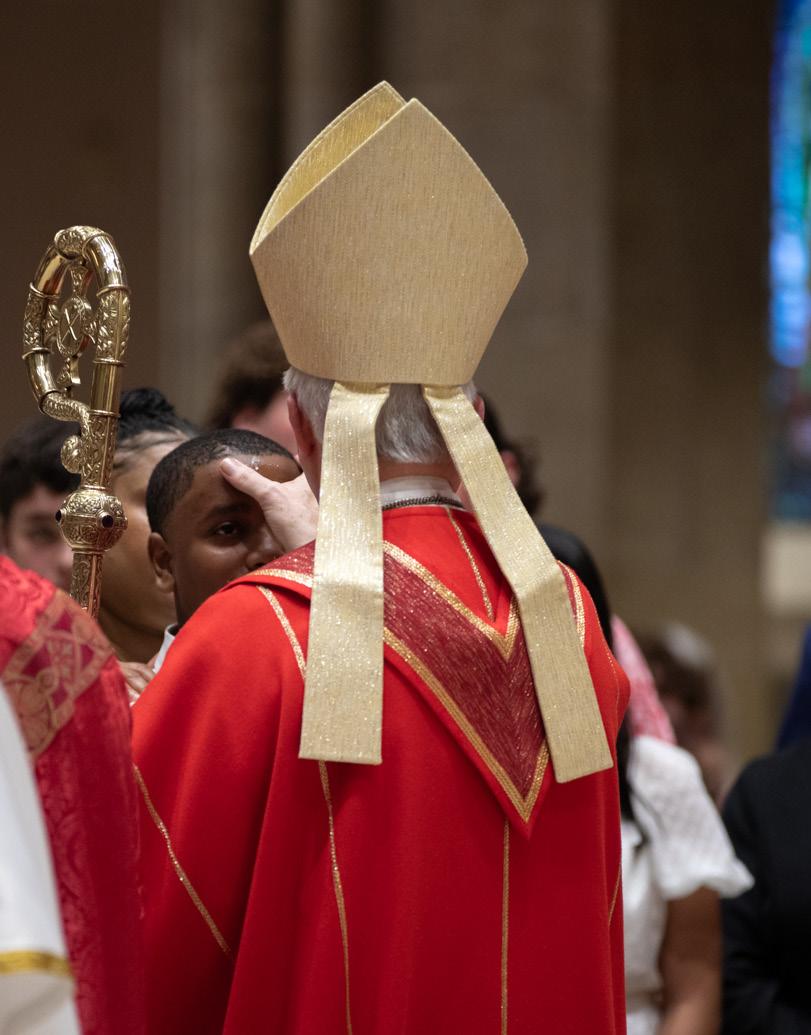
Religious Education plays a vital role in our community’s spiritual and moral development. More than just a curriculum, it is formation of the mind, heart, soul, and whole person throughout their lifetime. A central purpose of our Religious Education at the Cathedral is to help young and old understand and encounter the sacraments , the visible signs of God’s invisible grace. The seven sacraments are not simply rituals or symbols; they are real encounters with Christ that shape a person’s faith journey throughout his or her lifetime. They are at the heart of our Catholic life, offering grace, healing, and strength for this journey. Our baptism was the beginning of our Christian identity, the Eucharist is our nourishment, and our Confirmation remains our call to discipleship. We discover true mercy and forgiveness in Reconciliation, healing in the Anointing of the Sick, and beauty and a lifetime commitment in the Sacraments of Marriage and Holy Orders.
For a community to truly understand and live a sacramental life, they need more than intellectual formation; they must also be formed spiritually and personally. We in Religious Education at the Cathedral serve our community by guiding all ages into a deeper relationship with God through knowledge, reflection, and lived experience. The Cathedral’s program works to develop consciences and
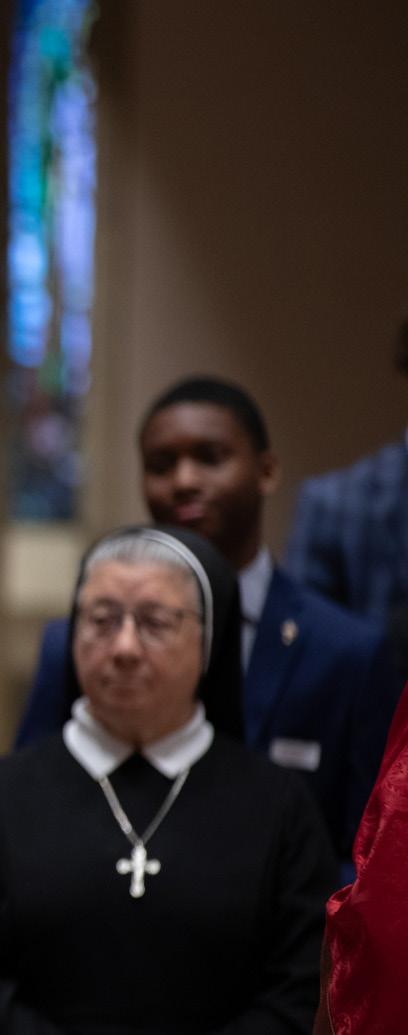
Religious
Forming Our Community
Education
in the Sacraments
moral decision-making skills that are rooted in faith and sacramental grace. We teach our students, and their parents. And we connect theological understanding with personal experiences to form our students into active participants of our Cathedral family, teaching them to live as faithful witnesses of our Catholic faith.
As a mother, it was through baptismal preparation that I first understood the parents’ role in children’s formation in the Catholic faith. As stated during the Rite of Baptism:
“On your part, you must make it your constant care to bring him(her) up in the practice of the faith. See that the divine life which God gives him(her) is kept safe from the poison of sin, to grow always stronger in his(her) heart. If your faith makes you ready to accept this responsibility, renew now the vows of your own baptism.”
When the Church says that parents are the “first teachers of their children in matters of faith," she recognizes that parents instruct their children in how to talk, walk, hold a cup, grasp a crayon, and sit attentively as they read together. Parents are also to encourage their children to engage in praying together and attending Mass.
Taking my own children to Mass was a challenge when they were little, but knowing that I promised God – both on my wedding day and at each child's
baptism – made me ready to accept this responsibility. I also knew that the strength and willpower to move what I considered mountains to get my family to Mass, dressed and on time, was not my own. It was through God’s grace and the consistent reception of the Holy Eucharist that I was able to move my precious mountains, my children, to Mass each Sunday.
The Cathedral offers opportunities throughout the year for everyone to grow. When our young children gather for religious instruction, adult faith experiences are offered in faith formation, outreach, and liturgical ministries. Our Adult Faith Formation leads parishioners on an educational journey into the heart of our faith’s mysteries by opening up Church’s teachings, looking deeper look into the scriptures, and pondering challenging questions as a community. Through outreach, we enter the secular community, bringing hope, forgiveness, and love to those who have fallen on hard times, both spiritually and physically. And our liturgical ministries draw us closer together through service at Mass.
We encourage our families to pray, attend Mass, and volunteer together. We gather on Cathedral Family Days throughout the year, celebrating our faith with joy-filled activities focused on learning, Church teachings, and theological understanding. Through our Confirmation Witnessing
program, the Cathedral partners with outreach programs to witness for our students how to live a life of service. As one such program, Respect Life Sunday unites our parish. Our elementary children pray the rosary with their families and our parish, and our Confirmation Class collects baby blankets and onesies for Mary’s House from our parishioners. We also host on this day an array of games that celebrate our Blessed Mother and her Fiat, her willingness to say, “Yes,” to God’s will.
Through the Cathedral’s Religious Education, our community sees that the sacraments are not isolated moments but part of a lifelong journey of grace. And through this religious education, we grow into active members of the Body of Christ, empowered by those sacraments to live lives of faith, service, and love.
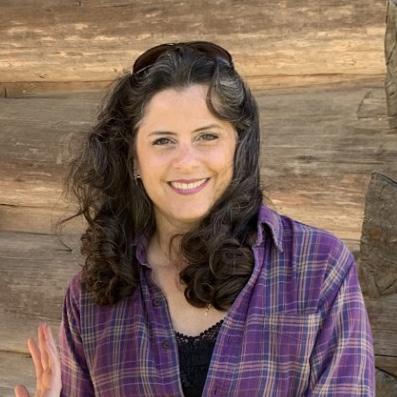
Sarah Romanski is the Director of Religious Education at the Cathedral of St. John Berchmans in Shreveport, LA.
Diocese of Shreveport Catholic Schools Ready to Go Under the Microscope
School Superintendent Sister Carol Shively, OSU, knows the Diocese of Shreveport’s Catholic schools do an outstanding job of educating youngsters. The question, however, is how good a job they do. How does one measure the quality of education provided to the diocese’s 2000 children?
In the spring of 2024, Sister Carol engaged a new accrediting agency created exclusively for Catholic schools and backed by the Catholic University of America. Unlike any other process, Lumen Accreditation melds a rigorous examination of a school’s Catholic identity with equally rigorous standards and benchmarks for excellent schools.
First developed by Loyola University of Chicago in 2012, the program examines schools’ quality in four areas: Catholic Identity, Academic Excellence, Leadership and Governance, and Operational Vitality. Combined, they cover every aspect and measure the effectiveness of an educational institution.
The first step was finding someone to coordinate the entire accreditation’s many steps, and Sister Carol Cimino, SSJ, former Superintendent of the Diocese of Buffalo, New York, was thus brought on to steer this endeavor. With over forty years of experience in consulting for dioceses across the
U.S., Sister Carol Cimino has also provided professional development to the Diocese of Shreveport since 2001.
The process of preparing the materials, a daunting task, had to be presented to the administrators of the diocese’s six schools, who, with their usual aplomb, embraced this task enthusiastically.
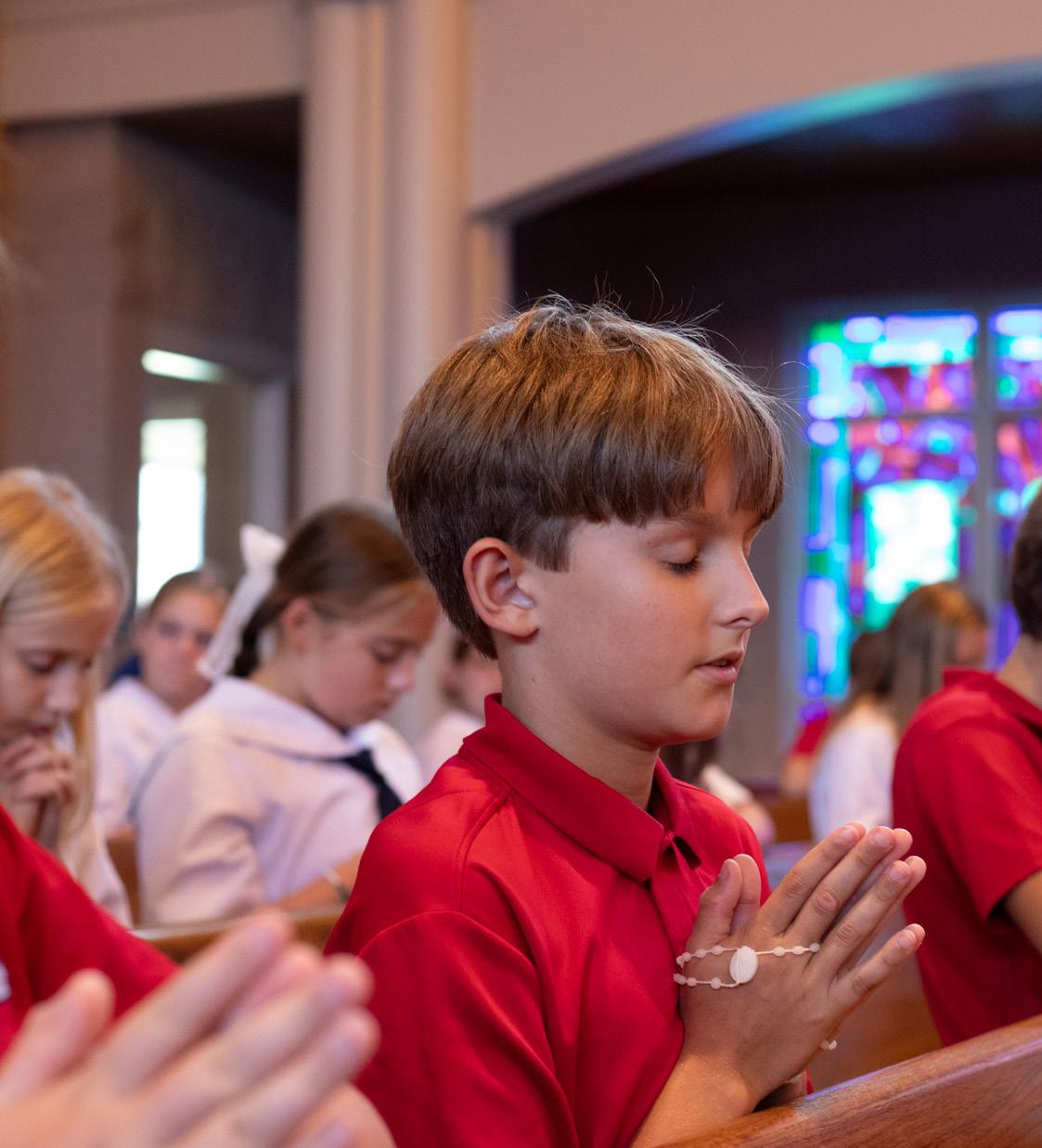
In August 2024, the school administrators and their local accrediting teams attended an allday retreat focused on their schools’ mission. “Having a time set aside for this kind of reflection was so inspirational and renewed my own commitment,” said Lisa Patrick, principal of Jesus Good Shepherd School in Monroe. Each administrator then replicated the experience with his or her own faculty and staff.
The real work began in September 2024, with principals and their own committees collecting data; distributing surveys to parents, teachers, and students; and providing evidence of their schools’ quality of education. This has involved literally hundreds of hours of painstaking data collection and input on an online platform. Principal TC Veit at St. John Berchmans School remarked, “This is some of the hardest work I have ever done, but we have a product that all of us can be so proud of; I can’t wait to share this.”
The schools of the diocese will have that opportunity to share their work this October. After a training session this August, school-visiting teams from Shreveport will review the data then visit the three schools in Monroe. Then, the school-visiting teams from Monroe will review the data and visit the three schools in Shreveport. “This will be a practice run for the external visit in March 2026, but even more, I think that the schools in Monroe will get a whole new appreciation of their counterparts in Shreveport and vice versa,” Sister Carol Shively said. “More importantly,” she continued, “they will be able to affirm the excellent work that has been done.”
That affirmation will be underscored when a visiting team from St. Louis, MO, arrives March 17, 2026, and spends four days reviewing the data and visiting each school to ascertain the internal review’s findings and impressions. Their report will not only affirm the schools’ assessment of their own quality, but will also help each school plan for areas needing attention. The final product: a roadmap for the school’s hope-filled future.

is a consultant for Lumen Accreditation.
Sr. Carol Cimino, SSJ,
School Boards and Councils for 2024-2025 School Year
Loyola College Prep School Board
- Bishop Francis Malone
- Leland Horton, President
- Arthur Carmody IV, Vice President
- Dr. Laurie Salvail, Principal, Secretary, Ex-Officio Member
- Tom Simms, Treasurer
- Mary Susan Britt, Member
- Rev. Raney Johnson, Chaplain
- Kristin Bernard, Member
- Dr. Angela Cush-John, Member
- Graham Walker, Member
- Jennifer Walls, Member
- Dr. John Carmody, Member
- Concetta King Chevallier, Member
- LeAnn Waldroup, Member
- Greg Doyal, Member
- Spencer Lamb, Member
- Ken Ward, Member
- Dr. Cooper Heard, Member
- Sr. Carol Shively, OSU, Superintendent, Ex-Officio Member
- Jolene Heard, Ex-Officio Member
- Clarissa Manno, Ex-Officio Member
St. Fredrick High School Board
- Bishop Francis Malone
- Josh Hays, President
- Violet Roussel, Vice President
- Michael Creighton, Treasurer
- Anthony Jacola, Secretary
- Bradley Hall, Member
- Justin Tarver, Member
- Amy Taylor, Member
- Scott Ashbrook, Member
- Marty Herlevic, Member
- Rebecca Leaumont, Member
- Dr. Lane Eddleman, Member
- Judge Tammy Sheridan, Member
- Chad Beasinger, Member
- Lauren Davis, Member
- Dr. Carynn Wiggins, Principal, ExOfficio Member
- Sr. Carol Shively, OSU, Superintendent, Ex-Officio Member
- Lisa Ware, Finance Officer, ExOfficio Member
St. John Berchmans Cathedral School Council
- Rev. Raney Johnson, Pastor
- Carol Gates, Recording Secretary
- Mary Beth Fox, Member
- Deacon John Basco, President
- Lisa Marcalus, Secretary
- Leigh Lewis, Vice President
- John Lowery, Member
- T.C. Veit, Principal, Ex-Officio Member
- Joseph Annibale, Vice Principal, Ex-Officio Member
- Christopher Jividen, Member
- Sr. Sunitha Augustine, SD, Member
- Missy Carroll, Business Administrator, Ex-Officio Member
St. Joseph Catholic School Council
- Rev. Jerry Daigle, Pastor
- Rev. Charles Ssennyondo, Associate Pastor
- Luisa Lemoine, Business Manager
- Ted Daigle, President
- Courtney Marston, Vice President
- Andrew Pringle, Finance Committee Chair
- Becky Lawson, Property/Grounds Chair
- Derrie Lindley, Alumni Chair
- Marianne Loftin, Member
- Daniel Flowers, Catholic Identity Chair
- Clayton Cobb, Principal, ExOfficio Member
- Katherine Suckle, Assistant Principal, Ex-Officio Member
Our Lady of Fatima School Council
- Very Rev. Peter Mangum, Administrator
- Donna Eichhorn, President
- Donna Glaze, Vice President
- Andrew Scurria, Secretary
- Kayla Heckard, Member
- Stephanie Haney, Principal, ExOfficio Member
Jesus the Good Shepherd School Council
- Very Rev. Peter Mangum, Pastor
- Tommy Hayes, President
- Albert Paxton, Vice President
- Michael Inzina, Treasurer
- Stuart Scalia, Secretary
- Eddie Clark, Member
- Susan Hopper, Member
- Dino Taylor, Member
- Lisa Patrick, Principal, Ex-Officio Member
- Haley Pulliam, Church Business Manager, Ex-Officio Member
Congratulations to Faculty and Staff Celebrating Work Anniversaries!
5 Years
Caroline E. Devanie - JGS
Lillian Paxton - JGS
Tiffany Carr - JGS
Sara Jones - JGS
Jessica Ray - LCP
Ben Schonfarber III - LCP
Anna Beth ClarkLCP
Sherrod Deion Lewis - LCP
Tessa Shea HoffOLF
Kirstyn Harris - OLF
10 Years
Megan Poindexter
Medlin - JGS
Landyn Michelle Luffey - JGS
Brandy Cascio - JGS
Jessica L. Smith - LCP
Lina P. PerezVasquez - LCP
20 Years
Traci Louise Wade - JGS
Susan Hymel - LCP
Debra CooperSFHS
Katenia HollandSFHS
Michael BarnettSFHS
Charles E. Holloway - SFHS
Elizabeth GriffonSFHS
Adam Ryland - SFHS
Amy Jo Scott - SJS
Julianne Raney Taylor - SJS
Janie Johnson - SJS
Rachel L. Balsamo - OLF Casondra
Browhow - OLF
Rhonda Kaye Davis - SFHS
Darlene Greber - SJS
Katherine Suckle - SJS
Trenda Suzanne Harbert - SJS
Jamie Rose Humphrey - OLF
Bridget Anne Morgan - SJS
25 Years
Lisa Rene Patrick - JGS
Judith May Edwards - JGS
Susan Shell Brady - LCP
Catholic Schools
By The Numbers
Enrollment in Catholic Schools 2022 - Present
Church Representation in Schools
DIOCESE OF SHREVEPORT NON-DISCRIMINATORY SCHOOL POLICY
July 2025
Shreveport, Louisiana
The Diocese of Shreveport School system re-affirms its nondiscriminatory policy on the basis of race, sex, color, national, and ethnic origin in its educational programs, activities, and employment policies in accordance with Title VI of the Civil Rights Act of 1964, Title IX of the 1972 Educational Amendments, and Sections 4.03 (a) and 4.03 (c) Revenue Procedure 75-50.
All students, faculty members and staff, without exception, are admitted to all rights, privileges, and activities generally accorded or made available at the schools which do not discriminate on the basis of race, sex, color, national, and ethnic origin in the administration of its employment policies, admission policies, scholarship, and loan programs, and athletic and other school-administrated programs.
St. John Berchmans, Shreveport
St. Joseph School, Shreveport
Loyola College Preparatory, Shreveport
Jesus the Good Shepherd, Monroe
Our Lady of Fatima, Monroe
St. Frederick High, Monroe
Sr. Carol Shively, OSU
Superintendent

This chart depicts the population of students who attend a Catholic school in our diocese and their registered parishes. The parishes highlighted indicate a consistent increase in enrollment over the last three consecutive school years. The data presented serves as a reminder for parishes to remain steadfast in carrying out the mission of introducing new families to our Catholic schools. One common misconception is the belief that the average family is unable to attend a Catholic school due to cost. However, there are several financial aid opportunities available. For instance, the voucher programs currently
and
Prayer and Service: Two Halves of One Sacred Mission
Each day, my heart fills with profound gratitude and a sense of mission, and I walk this journey within Catholic Education. I am reminded daily of the sacred responsibility we've been given – one expressed so beautifully in two intertwined callings: to pray for our Church and schools and to serve our schools. These are not two separate responsibilities, but two sides of the same celestial coin, each empowering and enriching the other, at the very heart of our Catholic education mission.
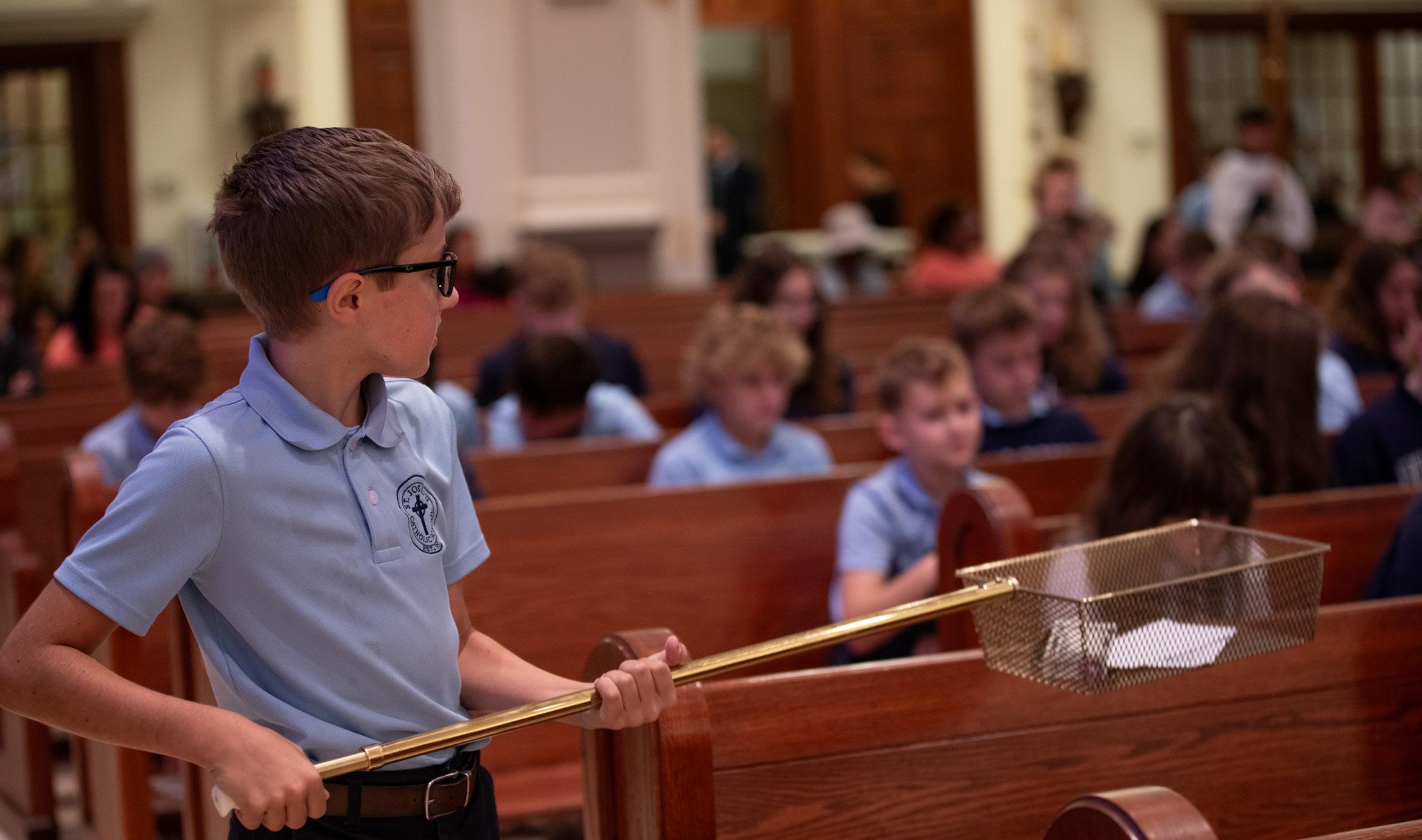
The
Invisible Foundation: The Strength of Prayer
Before the first lesson is ever taught and learned, before the first policy is ever established, before the first challenge is ever faced, there is prayer. Prayer is the breeze of our ministry, the unspoken yet powerful force that gives life to every effort in our schools. In sincere prayer, we seek God's wisdom to guide our decisions, God's grace to support our teachers and staff, and His divine presence to bless the learning environment for every child.
As we pray for our Church, we pray for its vibrant future, which is shaped significantly within our classrooms’ confines. We pray that our students become wiser in knowledge, faith, hope, and charity. We pray for their parents, to whom they are committed. And we pray for our dedicated teachers, who are truly co-ministers in this most noble work, sowing seeds of faith and knowledge every day. Your prayers, beloved parishioners, are an expansive , unseen architecture, supporting and energizing all that we undertake.
The Visible Fruit: The Gift of Service
Flowing out of this fountain of prayer is our call to serve. Service in Catholic schools is greater than mere academic teaching; it is fundamental ministry to mold the entire child – mind, body, and spirit – in the image of Christ. We serve by providing environments that foster academic success alongside Gospel values. We serve by enhancing critical thinking, encouraging creativity, and instilling a lifelong love of learning.
We also serve by educating for moral courage, ethical reasoning, and a rich understanding of our Catholic tradition. Our schools are where young people learn to value compassion, justice, and community. Our youth are ready not only for college and the workforce but also for a life of purpose and profound contribution to the world, to be virtuous leaders and joy-filled witnesses to their faith. Every act of teaching, every instance of guidance, every sacrifice for the welfare of a student is an act of abiding service to God and His people.
Two
Halves, One Sacred Mission
Our vocation’s beauty lies in this inseparable unity: our ministry to the schools is an extension of our prayer for the Church. We pray to serve well, and we serve because our act of praying has made our dedication more solemn and our hearts more receptive to God's will.
As parishioners, you are a vital part of this sacred mission. Your prayer, generosity, volunteer time, and presence in our parish community bring life to our schools. You are a partner in forming the next generation of good Catholics, responsible citizens, and caring leaders.
Let us continue to pray hand in hand and heart in heart for our Holy Mother Church and work diligently in our Catholic schools. United, we are building something eternal, molding souls for Christ, and creating a brighter tomorrow for everyone.
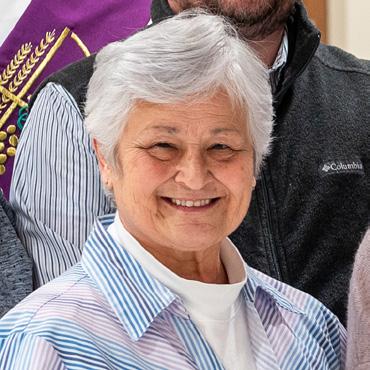
Sr. Carol Shively, OSU is the Superintendent for the Diocese of Shreveport Catholic Schools.
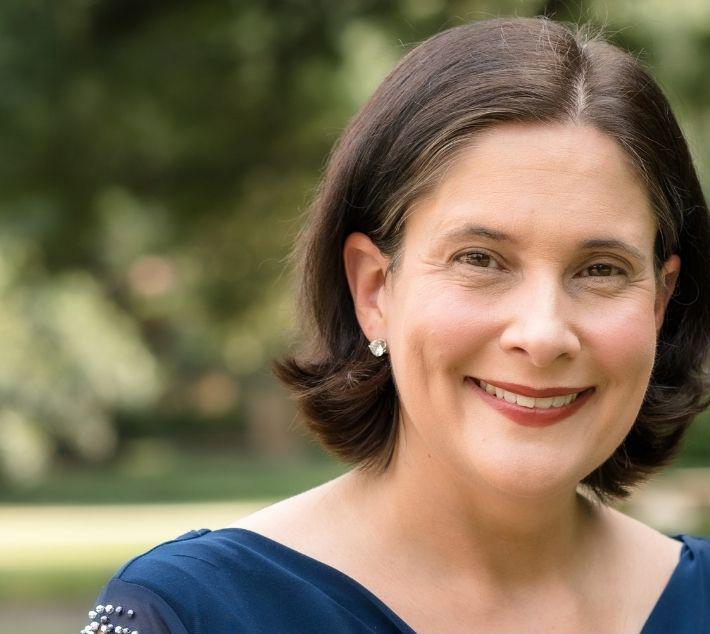
Meet Loyola’s New Principal:
Dr. Laurie Salvail Steps in to Lead the Next Chapter
As Loyola College Prep opens its doors for another school year, there’s a new face in the principal’s office – and she’s bringing with her a strong Catholic foundation, a love for learning, and a deep commitment to Loyola’s mission.
Dr. Laurie Salvail has officially taken the helm, appointed by Bishop Francis Malone, Sister Carol Shively, and Board President Leland Horton and

having the full support of the Board of Directors and the Principal Search Committee. It became clear to them during their extensive nationwide search that Dr. Salvail is the right leader to help Loyola take its next steps forward.
“We welcome Dr. Salvail to the Loyola College Prep family,” said Bishop Malone. “She is a devoted Catholic whose faith guides her leadership and
her approach to education. She understands the importance of forming students not just academically, but spiritually and morally, in keeping with our Catholic values.”
Dr. Salvail brings more than 15 years of experience in education. She’s been a classroom teacher, a curriculum director, and, most recently, the Executive Director of CYBER.ORG, a national organization expanding access to cybersecurity and STEM education. She’s taught everything from kindergarten to fifth grade, including at St. Joseph Catholic School, a fellow Catholic institution.
“It’s an honor to be named principal of Loyola College Prep,” Dr. Salvail said. “I will lead with humility and integrity, grounded in my faith and fully committed to helping young people grow in both mind and heart.”
Her experience includes designing STEM-focused curriculum, mentoring educators, and leading professional development across the country, and she holds a Ph.D. and Ed.S. in Curriculum and Instruction and a master’s degree in Educational Leadership. But beyond the credentials, Dr. Salvail brings something even more important: a heart for service and a love for Catholic education.
That passion sparked early, shaped by the values of the Brothers of the Sacred Heart during her time at Vandebilt Catholic High School and deepened during her formation at St. Francis Convent in Alton, Illinois. Those experiences guide her leadership today.
“Dr. Salvail brings a wealth of
experience and a sincere dedication to Catholic education,” said Sister Carol Shively, Superintendent of Catholic Schools for the Diocese of Shreveport. “I look forward to working with her as she begins this important role and continues our shared mission.”
Dr. Salvail succeeds longtime principal Johnny LeBlanc ’84, who closed out a remarkable 28-year career at Loyola this summer. His impact was felt across decades, roles, and generations of students. The search for his successor was intentional, thorough, and community-driven.
“I want to thank everyone who supported the search process over the last few months,” said Board President Leland Horton. “Dr. Salvail joins a long line of respected leaders, and we’re confident she will lead with both vision and heart. Loyola’s 125-year legacy is in good hands.”
As the 2025–2026 school year gets underway, Dr. Salvail has already been at work—meeting with students, families, faculty, and staff and preparing to build on the school’s strong foundation.
“I’m grateful for the opportunity to be part of such a vibrant and faithful community,” Dr. Salvail said. “Loyola has a rich tradition, and I’m excited to help carry it forward. Go Flyers!”
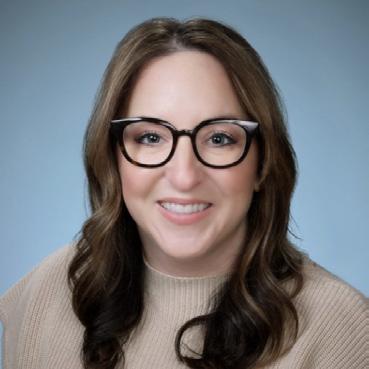
Jordan Harris is the Director of Communication for Loyola College Prep.
Why Pre-Cana?
July 3 marked the 10th anniversary of my engagement.
I was 44 years old and more than ready to get married. For those unfamiliar with my story, I did not marry until age 45 – yes, my first and only marriage. While I believe God brought us together, I admit to being puzzled about why He brought me a Baptist boy when I specifically prayed for a Catholic one. But as is often said, God always knows best. This Baptist boy, Ryan, is a true blessing in my life. I appreciate many things about him, but what stands out most is Ryan’s willingness to both accept and appreciate my Catholic faith. He never balked when I said getting married in a Catholic church was the only option. And he willingly participated in its marriage prep weekend, then called Engaged Encounter. Recalling this special time in our lives got me thinking: Why do we as Catholics need marriage prep?
I happened upon the May 13, 1996 document from the Vatican titled Pontifical Counsel for the Family: Preparation for the Sacrament of Marriage (www.vatican.va). While lengthy, it is well-written and worth a read. The introduction explains the importance of marriage in the Church and, hence, the reason it is one of our seven sacraments. It continues, “In the past , this preparation could count on the support of society which recognized the values and benefits of marriage.” Seeing the decline of marriages, increase in divorces, and new overall attitude toward marriage

contrary to the Church’s teachings, the Vatican perceived a great need for preparation before marriage: PreCana was born. I am embarrassed to admit I didn’t realize the name derived from the town of Cana, where Jesus performed His first miracle at… wait for it… a wedding.
While I cannot here quote much of the document, I do include the following from section seven: “The underlying doctrinal motivation that inspires this document comes from the conviction that marriage is a value that takes its origin from the Creation and that it is rooted in human nature. … Therefore, what the Church does for the family and marriage certainly contributes to the good of society as such and to the good of all.” I could not agree more! Since its indoctrination, Pre-Cana has evolved with a few small changes, but the overarching foundation in which it is rooted remains: marriage is a sacrament to be cherished by husbands and wives.
Reflecting back to 2015, I now recognize that amid all the wedding plans’ excitement there was also
anxiety about Ryan’s thoughts regarding Engaged Encounter. Would he consider it overkill or secretly not want to do it and be silently criticizing it? I chose to ask only whether he liked the overall weekend, although I was curious about his thoughts and whether he thought it at all beneficial. True to my husband’s quick (and sarcastic) wit, he shared that he did like it and simultaneously asked if the weekend was really a secret initiation into the Catholic Church to trick all the Protestants. I laughed, of course, as I answered no. So, if you happen to see my husband in church with me, make sure you go along with my answer…

Mary Arcement Alexander is a Licensed Professional Counselor & the Diocesan Victim Assistance Coordinator.
An Encounter with Christ
“The Sacraments express and realize an effective and profound communion among us, for in them we encounter Christ the Saviour, and, through him, our brothers and sisters in faith. The sacraments are... the power of Christ.”
Every generation eventually realizes that our future both belongs to and is dependent on our children. Yet, how we live some moments in our lives now impacts aspects of that inevitable new age that will belong to our current youth and adolescents. Part of our role as adults is also to help them prepare for what we leave them, and we do so hoping to bequeath a faith life stronger than our own.
We in the Church pursue this by constantly searching for how to best focus on sacramental preparation, for adults and children. Our Catholic schools prioritize this every school cycle, with parents and teachers exploring updated ideas in our desire to best fulfill this precious calling. Throughout the years, however, we are always moved to approach the sacraments from two vantage points.
First, we share theological teaching, whether our young people are in Catholic or Public schools. Second and of equal importance, we convey how we live with the ongoing impact of receiving each sacrament; in other words, how the sacrament changes us and our calling. It is this second aspect that I address here, sharing one of the creative ways we’ve discovered for our youth to meditate on our internal, ongoing conversion ignited by the sacraments.
Consider this Papal teaching:
“The Sacraments express and realize an
effective and profound communion among us, for in them we encounter Christ the Saviour, and, through him, our brothers and sisters in faith. The sacraments are... the power of Christ.”
— Pope Francis, General Audience, Nov 6, 2013 .
During sacramental preparation, we ask candidates to slowly read the above before we invite them to sit in silence and ponder this teaching’s meaning for them. We encourage their questions to clarify a word or phrase’s meaning, but we avoid teaching “what it all means.”
Instead, we next prompt candidates to quietly read it again, paying close attention to any word or phrase that might jump out at them or seem important. They’re asked to silently consider what the word or phrase might be “saying” to them.
For a third time, we ask them to read it and privately ask themselves:
“What does it mean to me to encounter Christ?”
“What is Christ asking of me in this encounter?”
We give them time and space for quiet thought and meditation, then suggest they silently write down whatever comes to mind from this experience.
Finally, we help candidates unpack the experience, patiently allowing those who are comfortable to share,
to unload, their thoughts, feelings, and other consequences from their meditation. They’re reminded that there are no right or wrong answers and this is a safe space with no judgment. We continue to gently ask how it feels to experience Christ. They do not have to answer us aloud. We are generous in waiting until they are ready to share, even if it takes weeks or months. They sit with this meditation many times before they are ready to make that first Communion or Reconciliation or their Confirmation.
And while we’re at it, we adults may need to ask ourselves about our own encounters with Christ and how we are being called and converted. In other words, what is Christ asking of me, today, as a result of the unfolding graces that continue to flow in me because of my own sacramental encounters with Christ? It is a question for every adult and youth to regularly return to throughout our lifelong journey of conversion.
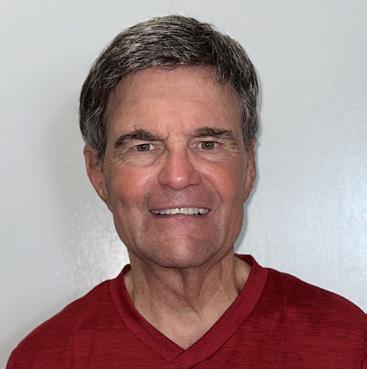
Mike Van Vranken is a spiritual director for the Diocese of Shreveport and a teacher of new spiritual directors for the Archdiocese of New Orleans.
Catholic Charities Celebrates 15 Years of Service
In the Summer of 2010, the Catholic Connection touted the beginning of a new organization: Catholic Charities of Shreveport.
Bishop Michael Duca and Sr. Pat Cairns had conducted extensive research into the needs of the community and expected the new agency would be “reaching out in concrete ways to serve the poor of our diocese” by the fall.
Poverty rates in our diocese’s civil parishes averaged around 20 percent but were as high as 35 percent, and families in rural areas had limited access to support. Our founders wanted the Catholic Church to have a role in the solution.
By October, the first Executive Director, Jean Dresley, had been hired and announced that the founding team’s focus was on basic needs, following Jesus’ teaching in Matthew 25: “Whatever you did for one of these least brothers of mine, you did for me.”
They chose four core areas: Immigration Services, Tangible Assistance, Parish Social Ministry, and Disaster Relief. Fifteen years later, two of those – Immigration Legal Services and Emergency Assistance – are still going strong. Since our opening we have distributed more than $2 million to prevent homelessness.
We also added programs, such as Gabriel’s Closet, which started in 2012 when the need to support parents of young children became clear. And, we developed our theory of change: education combined with temporary assistance can lead to long-term independence.
Education allows families to take control of what seems out of control; thus, all of our programs include an educational component.
To qualify for emergency assistance when seeking help with rent or utilities, clients attend the Money School to learn skills for better understanding their budget and common pitfalls. Clients are then invited to enroll in our credit or housing counseling services, which expands on the Money School lessons and prepares clients for their next steps.
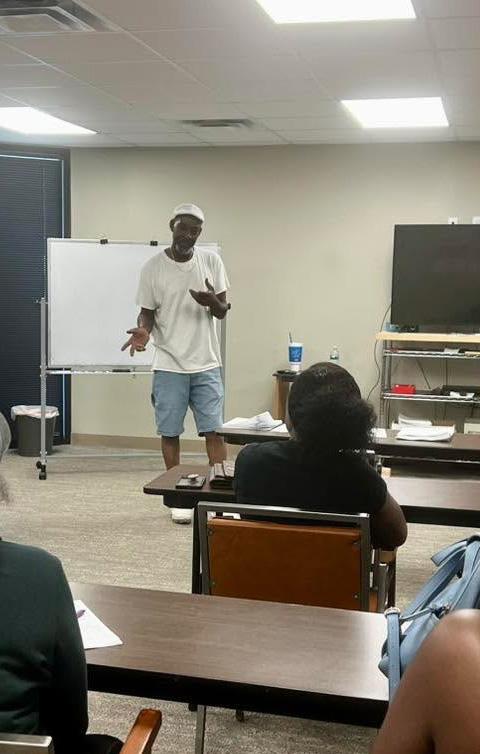
First Time Homebuyers Class
What: HUD-Certified class gives potential homebuyers all the information needed to purchase a home as well as access to benefits such as lower interest rates, down payment assistance and more. To successfully complete the class and qualify for benefits, you must attend all four classes.
When: 5:30 – 7:30 p.m. Aug. 19, 21, 26, 28
Where: 902 Olive St., Shreveport
Cost: FREE
To register: Call 318-865-0200
Similarly, to access the diapers and clothes in Gabriel’s Closet, parents both attend workshops and participate in community activities to earn “merits” for the closet. Doctors, nurses, and educators help fill the many gaps all new parents face when trying to do their best for their new babies.
This process has generated real change! One graduate of our first-time homebuyers’ class gained thousands of dollars in assistance toward buying his first home and returned a few weeks ago to share his story with a new class. Moms with children too old for Gabriel’s Closet refer their nieces or return with donations for the next mom in need. And immigrants who became citizens have made financial gifts.
Looking to the next 15 years, we continue seeking ways to address families’ immediate needs while equipping them to avoid future crises. It might be by expanding current programs to better serve parents and babies or by addressing a different gap in the system.
Charity is part of our DNA as Catholics, and we have the tools to make a difference. You can join us for our next 15 years by making a gift today at www.ccnla.org/donate. As our founder Sr. Pat said, we have to be ready to adapt and meet the needs of the times, for “Scripture tells us the poor will always be with us, but they need not be the same poor.”
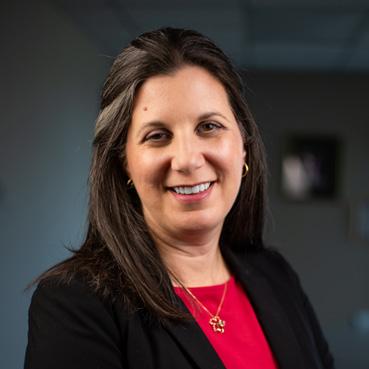
Diane Libro is the Executive Director of Catholic Charities of North Louisiana.
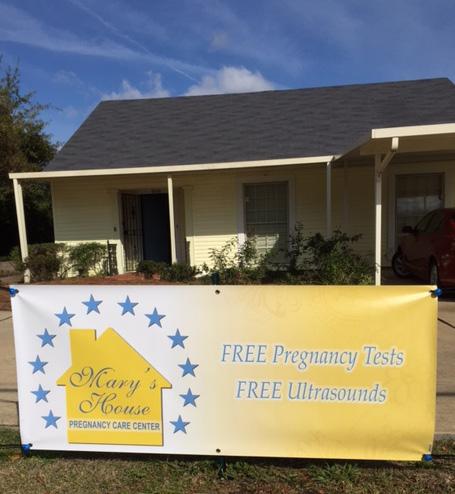
Mary's House Pregnancy Care Center Seeks New Director
In 2014, I was approached with the idea of opening a pregnancy center where Catholics could volunteer and help pregnant women choose life. That year, over 4000 babies died at the abortion centers in Shreveport and Bossier City. With the help of many people, the idea took shape, and on November 20, 2015, Mary's House opened.
Countless stories showcase how God provided for us at every step: A huge empty house was offered for rent at nominal
cost; an ultrasound machine was donated before we even opened; doctors, nurses, sonographers, and volunteers donated time, skill, and wisdom. All of this from an idea to encourage women in unplanned pregnancies to choose life.
Since opening, Mary's House has served over 5,000 pregnant women. We confirm their pregnancies with tests and ultrasounds, make appointments with doctors, and follow moms throughout their pregnancies. We've celebrated births and cried and prayed because of miscarriages.
Doctors, hospitals, ERs, and patients know Mary's House as a place that serves pregnant women. Thousands of new blankets, baby items, and hours are donated to help women overcome fear: a mother leaves the building confident that she can have her baby, because she’s not alone.
In July 2026 (yes, 2026), I will retire. It's been a wonderful time serving as Director of Mary's House, and I am excited to see what God has planned next for this valued pregnancy center.
In the meantime, our Board of Directors is searching for a new director for Mary's House. Starting this summer gives us time to hire the right person, who can then be trained and get to know the staff, volunteers, and how it all works. The plan is for the new director to be fully integrated into Mary's House before I retire.
If you have a heart for serving pregnant women and loving staff, volunteers, donors and patients, visit our website at MarysHouse.net for details and where to send a resume.
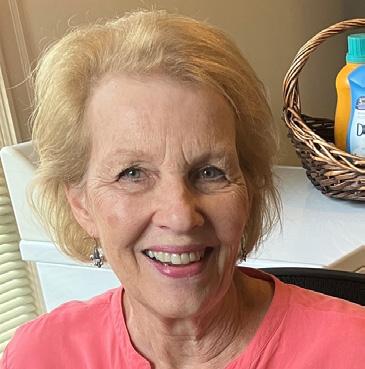
L'Anne Sciba is the director at Mary's House in Shreveport, Louisiana.
Seminarian Burses
Thanks to our Recent Donors: (005) Cathedral of St. John Berchmans Burse
The Congregation of St. Johns Roman Catholic Church
Dr. Elise and Mr. Tobias Switzer
Ms. Janet Brossett In honor of Father Raney Johnson's fourth anniversary of ordination to the priesthood.
New Burse (005)2 Cathedral of St. John Berchmans Burse #2
Dr. Elise and Mr. Tobias Switzer
(006)2 Msgr. J. Carson LaCaze Memorial Burse #2
Anonymous (008) St. Jude Parish Burse
Anonymous (011)2 Rev. David Richter Memorial Burse #2
Anonymous
Dorothy Jarzabek (018) Knights of St. Peter Claver Council 144 Burse
Deacon & Mrs. Charles Thomas (023)2 Msgr. Edmund J. Moore
Memorial Burse #2
Patricia L McGraw (032) Madeline & Joe Tiller Memorial Burse
Mr. John G Cofer (In memory of Mr. George NeJame)
Merrilee Streun-Leatherman (In memory of Mr. George NeJame)
James & Donna Barnard (In memory of Mr. George NeJame)
(035)4 Dr. James V. & Rosemary C. Ward Burse #4
Mrs. Rosemary C. Ward
Mr. Richard W. Ward
(036)5 Msgr. Earl Vincent Provenza Burse #5
Mr. & Mrs. Ronald Looney
Mrs Edna Delphin
Mr. & Mrs. Charles J. Madden
(049) Rev. Philip Michiels Burse
Mr. and Mrs. Robert McGowen (050)2 St. Joseph Shreveport Mary's Workers Burse #2
James & Donna Barnard (In memory of Mr. Will Bittick, Barbara Hall, Mr. Lavoid
Holloway & Ms. Nona Dailey)
New Burse (062) Joan E. Anderson
Sneed Memorial Burse
Mr. Billy G. Sneed
Incomplete Burses:
(001)2 Fr. Mike Bakowski Memorial Burse #2 ($1450)
(002 Joseph & Antoinette Bakowski
Memorial Burse ($3250)
(003) Sam R. Maranto Memorial Burse ($1750)
(004) Kathryn Atherton Cook
Memorial Burse ($350)
New Burse (005)2 Cathedral of St. John Berchmans Burse #2 ($76)
(006)2 Msgr. J. Carson LaCaze
Memorial Burse #2 ($8832.12)
(007) Dr. Carol Christopher Memorial Burse ($1200)
(008) St. Jude Parish Burse ($9000)
(009) St. John Berchmans Knights of Columbus Council 10728 Burse ($1550)
(011)2 Rev. David Richter Memorial Burse #2 ($6800)
(015) Bishop’s Seminarian Burse ($5735)
(016) Elaine Malloy Frantz Memorial Burse ($1000)
(017)2 Msgr. George Martinez Knights of Columbus Council 1337 Burse #2 ($2004)
(018) Knights of St. Peter Claver Council 144 Burse ($1470)
(021) Rev. Edmund "Larry" Niehoff
Memorial Burse ($2350)
(022) Rev. Blane O'Neil, OFM
Memorial Burse ($1578)
(023)2 Msgr. Edmund J. Moore
Memorial Burse #2 ($1250)
(024) Rev. Joseph Puthupally Memorial Burse ($5000)
(025) Kathleen Hightower Memorial Burse ($800)
(027)4 Rev. Richard Lombard
Memorial Burse #4 ($5000)
(028) Friends-n-Faith Burse ($750)
(029) Rev. Kenneth Williams
Memorial Burse ($400)
(030) Ottis and Anne Krupa Littlejohn
Memorial Burse ($7666.67)
(032) Madeline and Joe Tiller
Memorial Burse ($8350)
(035)4 Dr. James V. & Rosemary C. Ward Burse #4 ($1470)
(036)5 Msgr. Earl Vincent Provenza Burse #5 ($5301)
(037) Manuel & Catherine Licciardi, and John & Beverly Miller Burse ($7000)
(038) The Malone Family Burse ($500)
(039) St. Elizabeth Ann Seton Knights of Columbus Council 9260 Burse ($750)
(045) Sister Martinette Rivers
Memorial Burse ($525)
(046) Domestic Church Burse ($5000)
(047) Troops of St. George Burse ($6000)
(048) Rev. Joseph Kallookalam Burse ($5000)
(049) Rev. Philip Michiels Burse ($2600)
(050)2 St. Joseph Shreveport Mary's Workers Burse #2 ($310)
(052) Dr. Matthew Ragan Green, Jr. Memorial Burse ($1750)
(053) Leo N. Plette Memorial Burse ($5000)
(054) Fr. Franz Graef Memorial Burse ($2500)
(056) Hazel Iles and John Paul Woodley, Sr. Memorial Burse ($500)
(057) Father Robert Inzina Memorial Burse ($2500)
(058) Monsignor Warren T. Larroque
Memorial Burse ($2500)
(059) ACTS of Northwest Louisiana Burse ($750)
(060) Father David Buss Memorial Burse ($2500)
(061) Sister Maria Smith, DC
Memorial Burse ($2500)
New Burse (062) Joan E. Anderson
Sneed Memorial Burse ($1000)

To donate to an established seminarian burse, please scan here!
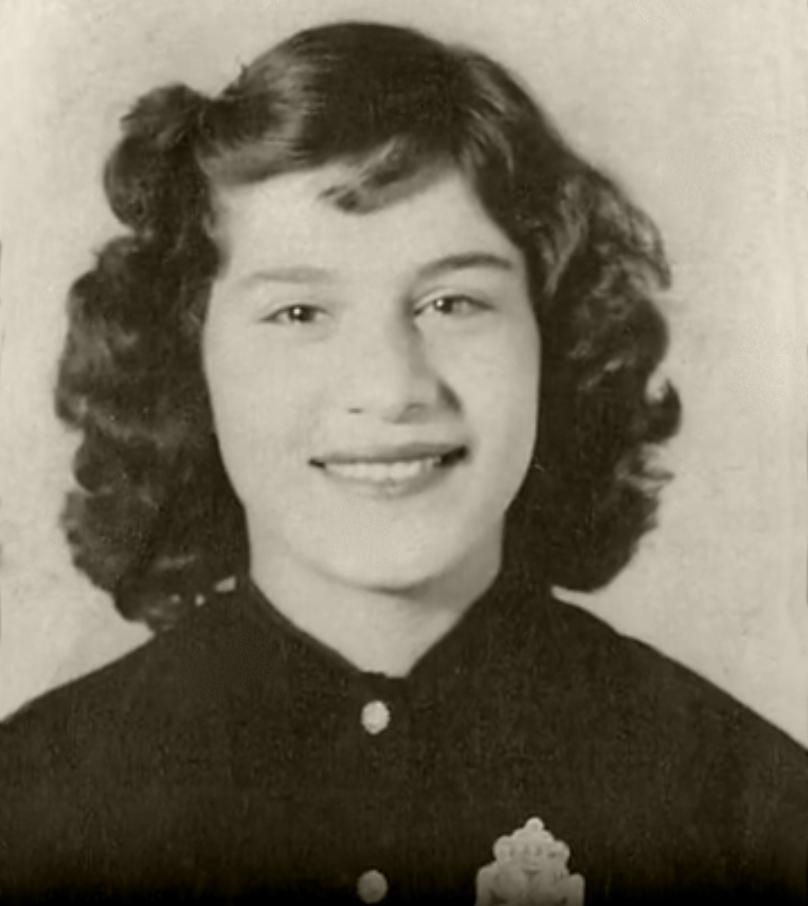
Mr. Billy G. Sneed has established a new seminarian burse in honor of his late wife, Joan E. Anderson Sneed. This initiative reflects his commitment to preserving her memory and highlights the remarkable legacy she left as a devoted wife, mother, and caregiver. Joan's compassionate spirit and dedication to her parents and other elderly family members are qualities that Mr. Sneed wishes to celebrate through this burse.
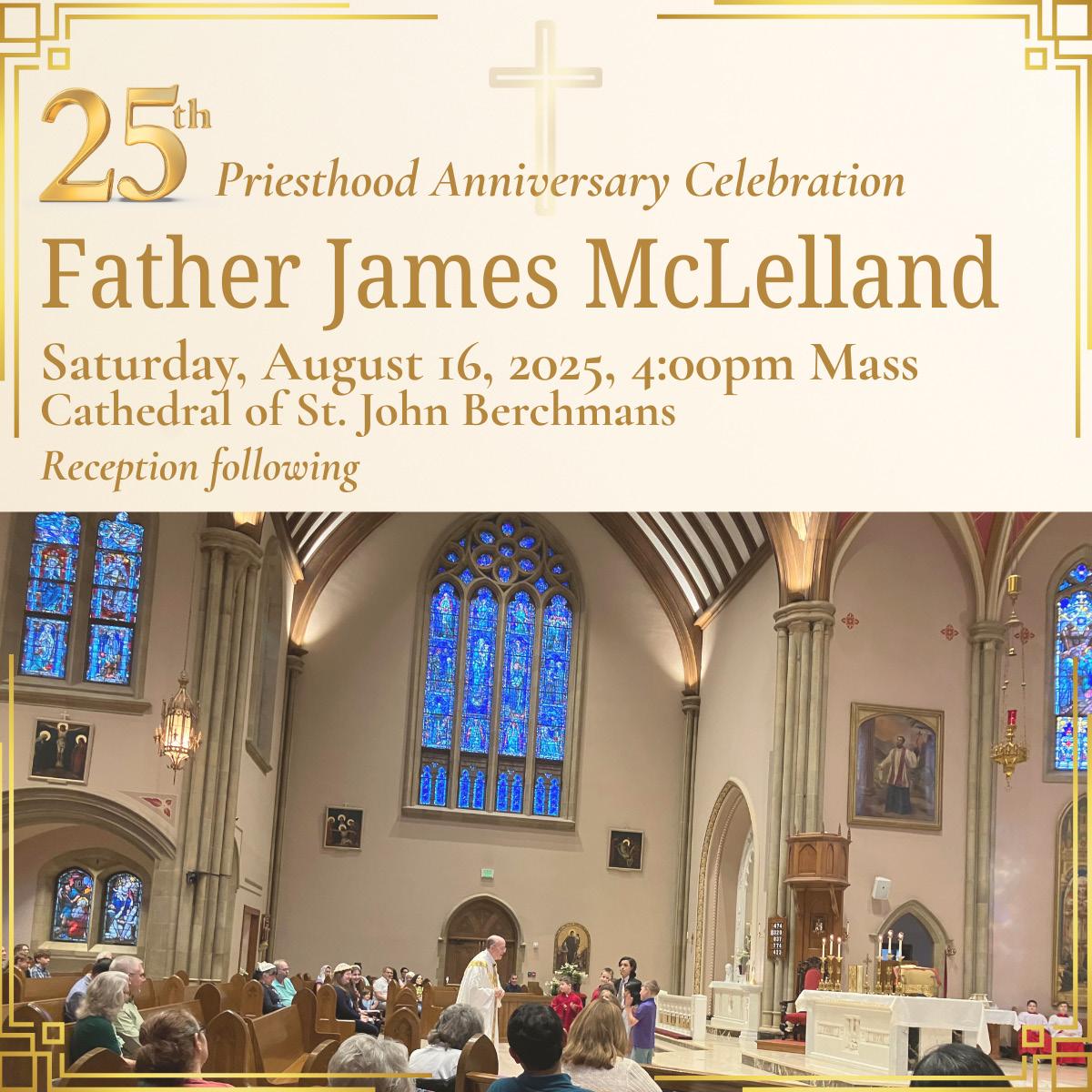
Gifts to the Diocese of Shreveport's Seminarian Burse Program create a legacy of giving in support of our seminarians. It currently costs an average of $50,000 per year to educate and support one seminarian and we are blessed to have six at this time.
A seminary burse can be opened with a donation of $250 or more. A burse is completed when it reaches $10,000. Once a burse is open, it can receive donations in any amount. Burses can be opened to memorialize a loved one, honor a priest, and represent a group or organization. Anyone can contribute to any of the diocese's incomplete burses.
For a list of incomplete and completed burses, please scan the QR code on this page or visit www.dioshpt. org/seminarian-burses
For more information on how to establish or contribute to a burse, please contact the Development Office at (318) 219-7260.
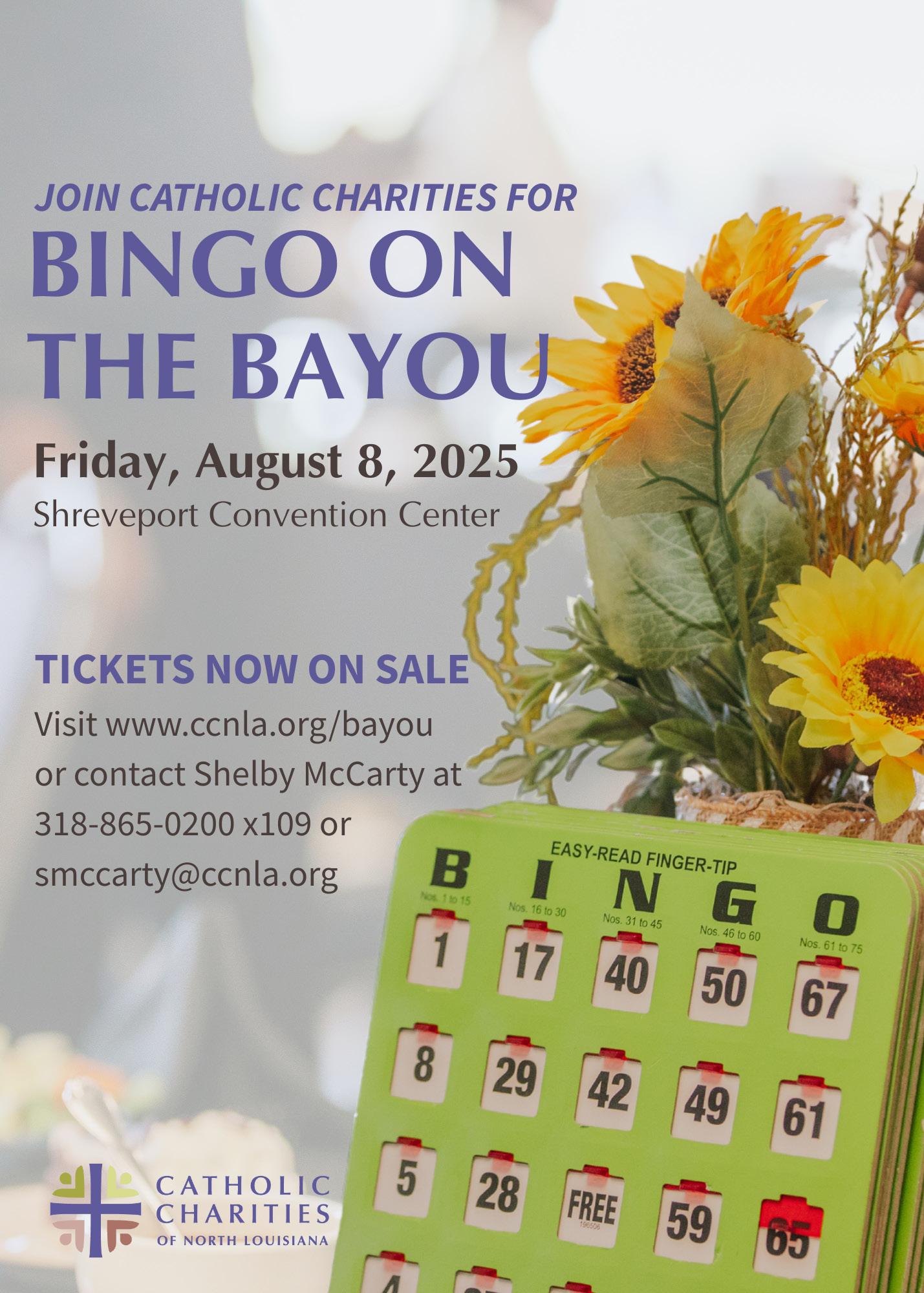
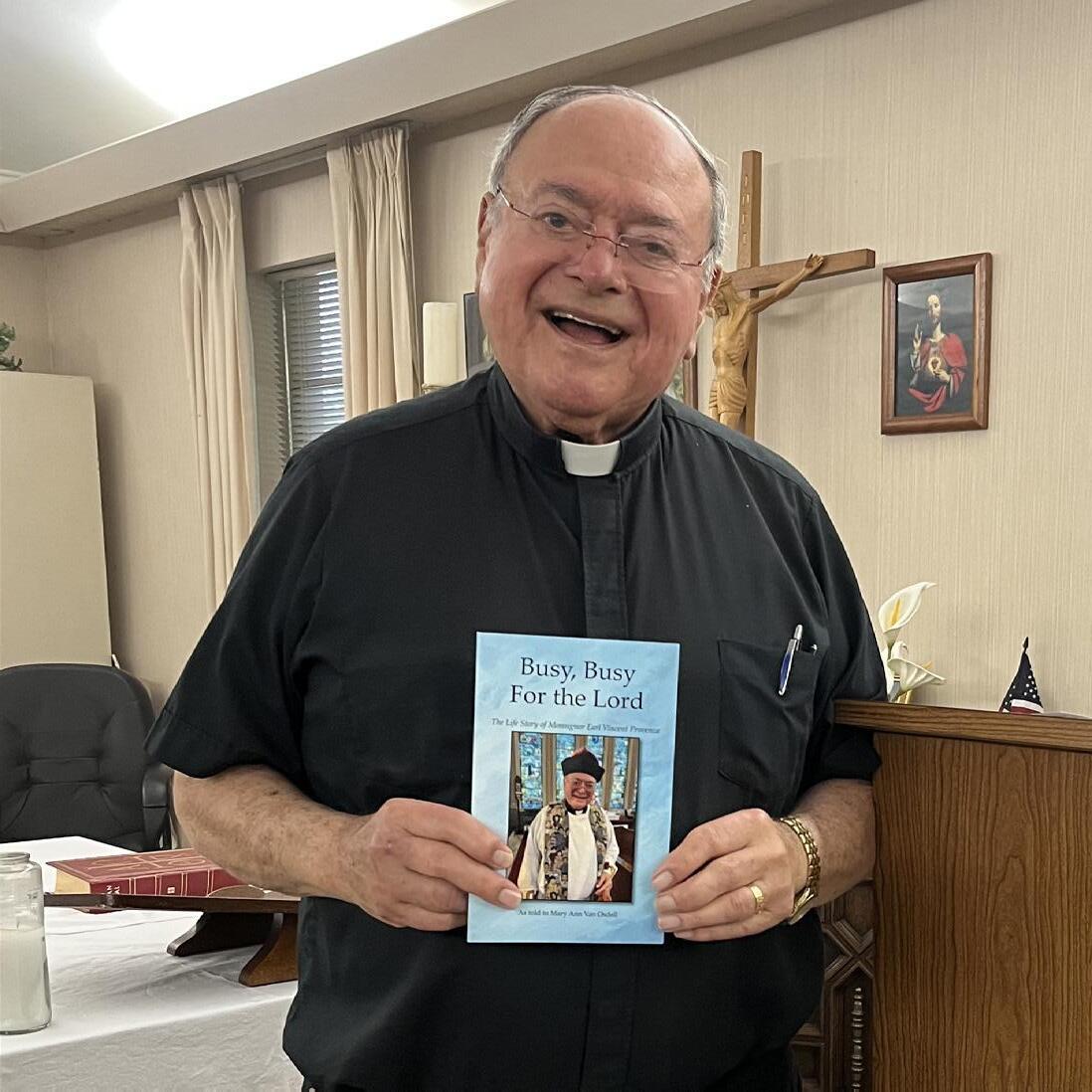
Busy, Busy For the Lord,” self-titled by Monsignor Earl Vincent Provenza, is the life story of his 60 years of priesthood.
The story delves into the many hats he has worn, as told to Mary Ann Van Osdell, a local journalist who self-published it. She is a lifelong member of St. Joseph Catholic Church.
Provenza has been a Knights of Columbus camp director, scrub technician, firefighter, chauffeur, barber, marathon runner, and cook (his Italian sauce recipe is included).
He has been a chaplain to the Sheriffs and State Police, U.S. Army and U.S. Air Force Reserves, Knights of Columbus, and Mardi Gras krewes.
In the book, he discusses close calls and temptations, beginning with those in his childhood and the seminary.
The chapter “You Know Me” is about: Miss USA 1958 from Bossier City, celebrating five sacraments in the same church on the same day, missions to Ukraine in the 1990s, the renovation of St. John Berchmans, planning Pope John Paull II’s visit to New Orleans, and sayings that helped in his priesthood. Another chapter shares about being an undertaker, funeral director, transporter of the body, grave digger, and presider of the funeral.
The book ends with a list of his favorite things.
"Busy, Busy for the Lord"
Biography of Msgr. Earl Provenza Published by Local Journalist
“Mary Ann would tell me I have interesting stories and say, ‘Tell me a story,’ [then], ‘Tell me another one.’ Before we knew it, there were enough for a book,” Provenza said.
His church assignments ranged from Shreveport-Bossier City and Monroe to Alexandria and from Mansura to Zwolle. Named monsignor on June 10, 1989, he fully retired (but not really) on July 2, 2018. He is still busy, busy for the Lord, performing funerals and filling in for priests.
His book is available at Grace and Mercy Gifts, 6425 Line Ave.
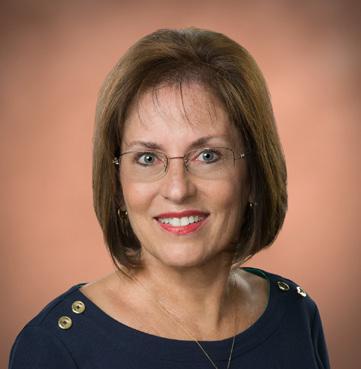
Mary Ann Van Osdell is a journalist, author, and lifelong parishioner of St. Joseph Catholic Church in Shreveport, LA.

Cathedral of St. John BerC hmanS
CatholiC SC hool
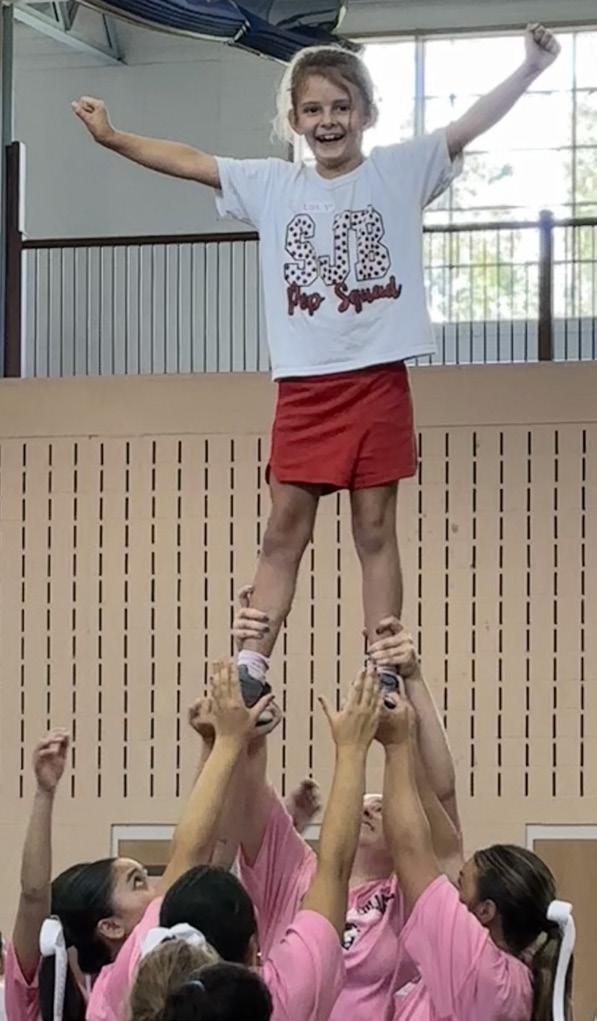
Summertime in many schools is a quiet time of dimmed lights and locked classrooms, but at the Cathedral of Saint John Berchmans Catholic School, summer is vibrant and filled with love, laughter, and learning! Our school administration has been busy creating new enrichment opportunities, including Robotics, WeightTraining, French I, and Science Olympiad. The Cathedral’s Vacation Bible School, “Trusting Jesus in a Wild World,” was a roaring success with school and parish families and our very own SJB student volunteers. The summer choirs are making appearances around the city with Mrs. Barr, and the famous SJB Summer Camp remained in full swing through July, with campers from all over the city, ages K3-eighth grade. As during the academic year, our campers’ days are filled with learning and growing through action, activities, and academic fun.
With a grateful shoutout to our Parent Teacher Organization, SJB ordered 17 laptops and four new desktop computers for our faculty. As part of our ongoing technology maintenance and upgrades, these devices were almost fully funded by the fundraising efforts of our parents in the PTO. As a service project, the rising eighth grade class plans to repair and repaint the Jesuit’s Wall (movie nights are coming to SJB!). Shreveport’s Master Gardeners granted our school a brand new greenhouse for a year-round environment where our young gardeners and budding scientists can watch and learn about growth in God’s creation.
June’s Altar Server Camp at the Cathedral hosted over 50 volunteer student servers from the parish and school to learn, share their experiences, and bond over a pizza dinner. SJB alumni servers and new altar servers gathered together to learn ancient rites and responsibilities. So much to learn and do, and the SJB Cardinals continue striving toward growing a servant’s heart.
Pope Leo XIV stated in his remarks on the Church’s first ever Jubilee of Sports, “Sport, especially team sports, teaches the value of cooperating, working together, and sharing. These are at the very heart of God’s own life.” SJB’s upcoming year offers numerous sporting opportunities, from basketball and football to volleyball, golf, swimming, running, and more. Our Middle School Cheer Squad competed for the first time at Northwestern State’s National Cheerleader Association and brought home team and individual All-American Awards. Cardinal athletes are training and competing, filling these summer months with the joy found in bonds of teamwork while growing stronger together.
With all of this to share and celebrate, none of it is more beautiful than our Confirmandi entering the church on June the 8th. This group of eighth graders has traveled through SJB’s hallways, many of them having celebrated together milestones from First Communion Day to graduation. The SJB family continues to grow in academics, enrichments, and athletics, but our primary joy is the spiritual growth of every student, faculty, and family – living for God. Enrollment at the Cathedral of Saint John Berchmans Catholic School is open, and we would love to welcome your family to our family. Call today to grow with us at SJB!

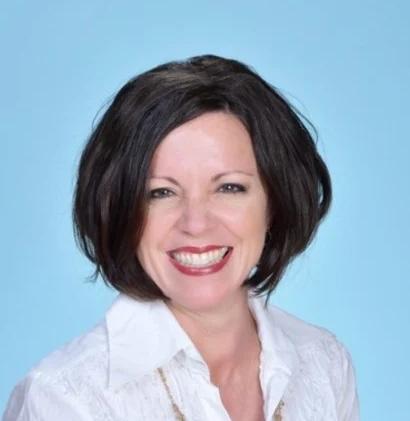
Sarah Duncan is the librarian and Media Arts teacher at St. John Berchmans Cathedral School.

St. JoSeph CatholiC SC hool
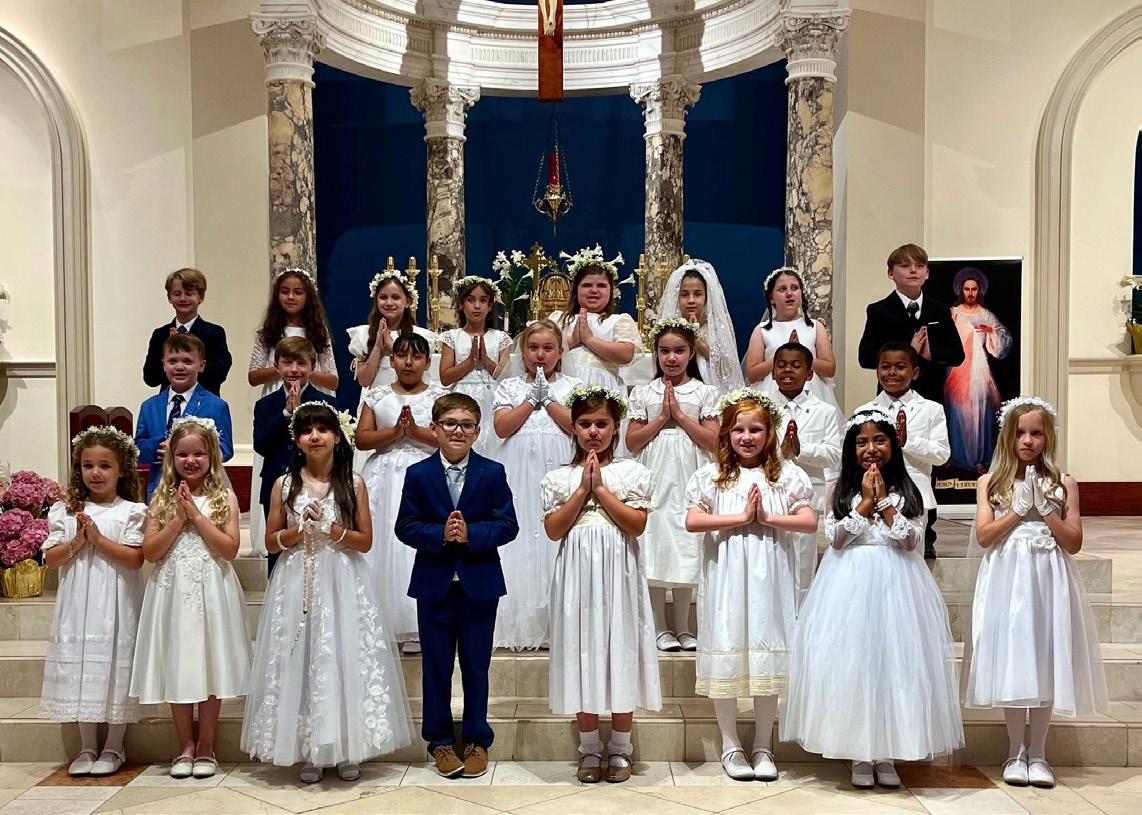
Catholic schools were established as critical ministries of the Catholic parishes in the United States to form and educate Catholic children in the faith. Since the late 1700s, lay and religious have labored diligently to ensure a Catholic identity. The most essential way for this is in preparation for the sacraments, which enables us to fully experience the grace of God and live a life united closely to the Holy Trinity. It is, then, the Catholic school’s mission to ensure that this occurs for the young people entrusted to our care.
Throughout its history, St. Joseph Catholic School has been no exception. Since 1951, we have fulfilled the task of meeting the sacramental formation needs of the children in St. Joseph school, our parish, and the surrounding parishes in our deanery. This mission was first carried out under Bishop Charles Greco’s direction when he founded our parish over 75 years ago.
Our school also prepares students to experience life in the Holy Trinity through additional practices. It is imperative that each child have the opportunity to encounter Christ in a time of prayer and reflection; thus, our students attend First Friday Eucharistic Adoration monthly. This is important because it conveys the sacramental life’s necessity and encourages devotion to Christ in the Eucharist beyond Sunday and Wednesday liturgies.
Throughout the year, each class go es on retreat. Whether fullor half-day experiences, students learn more about their faith and see their faith more fully lived and experienced. Retreat days enable students to pray and interact with one another in
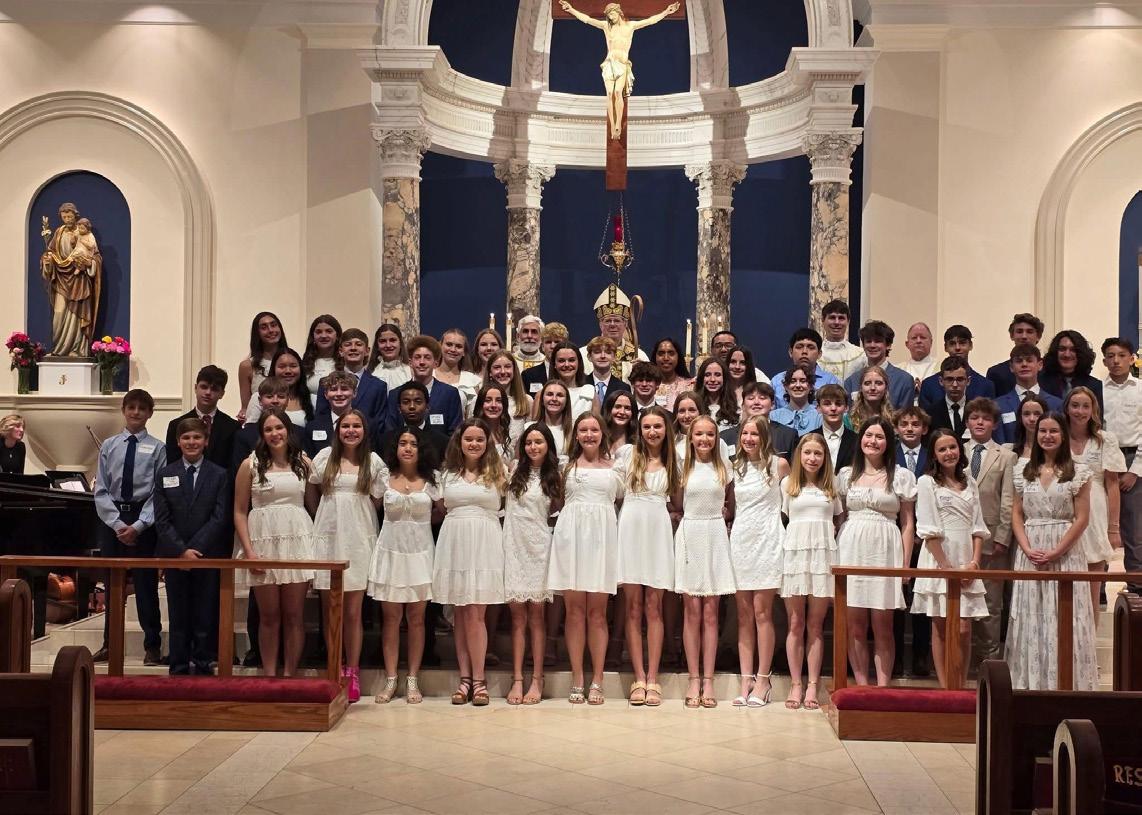
a manner the classroom setting may not allow.
Because they are preparing for Confirmation, middle school students have an expectation that they’re to answer the call to get involved through service hours. While it’s a presumed responsibility, most students find joy in making a difference in the lives of fellow students, teachers, their parishes, and local communities. We believe this encourages students to live lives inspired to serve, which the Holy Spirit perfects within them when He seals them with His indelible mark in Confirmation.
This year, we again open our doors to over 300 students. We pray that their experience in a life of grace will transform them, our school, and our local church in the Diocese of Shreveport. Let us pray for their teachers, who are called to instruct and form them. Let us pray for their parents, their first teachers, who chose Catholic schools to help carry out this task . And let us pray for all our young people who are part of this community, that they respond to God’s call to a life of grace.
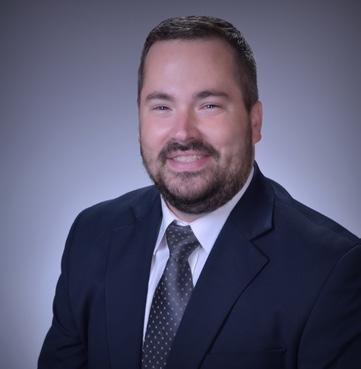
Clayton Cobb is the principal of St. Joseph Catholic School in Shreveport.

JeSuS the Good Shepherd CatholiC SC hool
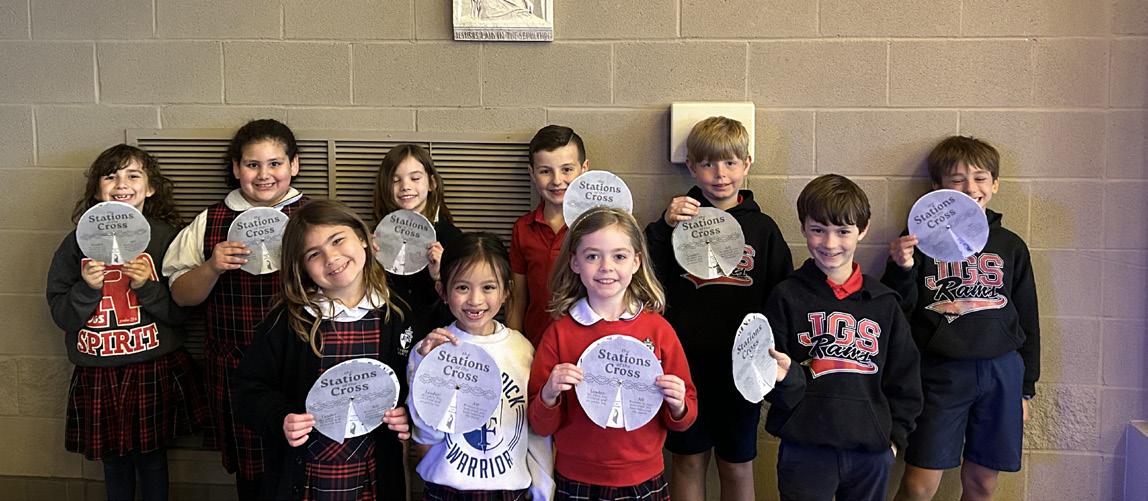
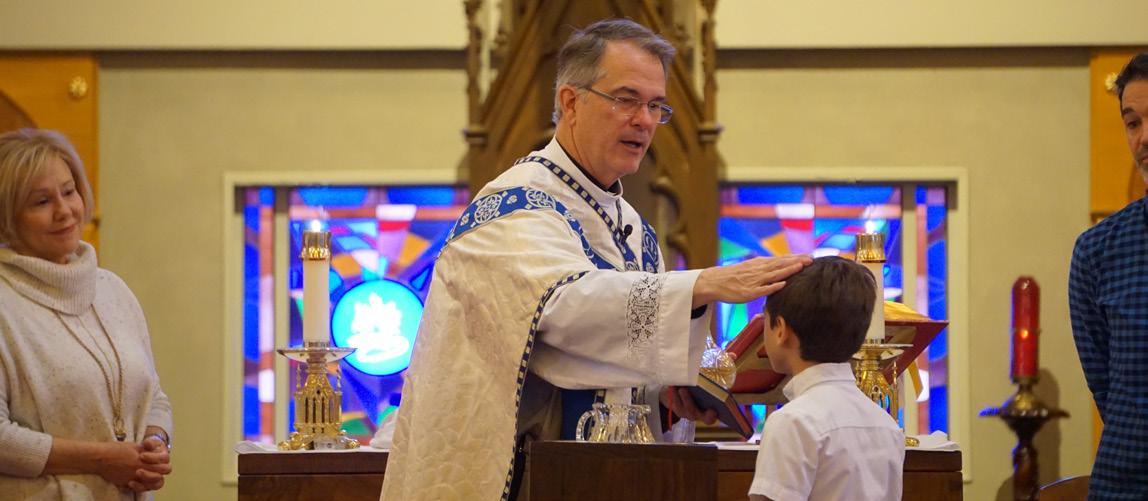
Since 1960, Jesus the Good Shepherd School has been grounded in a rich tradition of faith, academic excellence, and spiritual formation. As a ministry of Jesus the Good Shepherd Parish, we believe that nurturing a love of learning, God, self, and others begins by shaping young hearts and minds in the image of Christ.
The foundation of our Catholic identity is built upon the sacraments – beginning at Baptism and continuing throughout each believer’s life. At JGS, sacramental preparation is a shared journey between the school, parish, and family, with each playing a vital role in supporting our students’ spiritual growth.
Every year, our second-grade students prepare for their First Reconciliation and First Holy Communion through a thoughtfully designed curriculum that combines meaningful spiritual experiences with classroom instruction in sacramental theology . In addition to academic lessons, students participate in daily prayer, weekly Adoration of the Blessed Sacrament, and school Mass. Hands-on opportunities, such as sacristy tours and engaging faith discussions with Fr. Peter Mangum, make the sacraments come alive in ways that are both accessible and transformative. These experiences do more than educate; they cultivate lasting habits of prayer and reverence.

At JGS, Christ’s presence is not confined to the religion class. It echoes in our hallways, fills our classrooms, and guides our conversations. We are not simply preparing students for academic success – we are preparing them for a life rooted in discipleship.
Through our strong academic program and intentional Catholic formation, we strive to raise students who are faith-filled, thoughtful, and courageous; ready to serve both the Church and the world. As we continue the mission of forming future saints, we do so with great hope –knowing the seeds we plant today will bear fruit for generations to come.

Amy Fakhre is the Director of Development at Jesus the Good Shepherd Catholic School.

In a time when digital noise fills every hour, quiet, faithful reading can be a revolutionary act of discipleship. At Holy Trinity Catholic Church in Shreveport, we’ve found a fruitful and straightforward way to promote this act: a monthly spiritual book review project called Ex Libris.
Published in our parish bulletin and available online, Ex Libris offers engaging, doctrinally-grounded reviews of Catholic books – classics and contemporary works alike –that deepen spiritual life, inspire conversion, and encourage fidelity to the truth.
The Latin phrase Ex Libris means “from the library.” Indeed, this project arose from a desire to dust off the spiritual treasures many Catholics have yet to encounter. Books by saints, modern theologians, and faithful Catholic authors are featured monthly, with a review designed to be accessible to the average lay Catholic while maintaining theological depth. Our goal is not simply to recommend good reading but to form readers for eternity.
Whether it's a sobering call to repentance like The Hell There Is by Msgr. Charles Pope or a memoir-cookbook hybrid like Sicilian Soul Food: A Legacy of Love by Agatha Fertitta McCall, selections are chosen for their capacity to shape the heart and mind according to Christ.
Why a reading apostolate? Because Catholics are hungry! Many seek guidance, clarity, and substance. Good Catholic books – rooted in magisterial truth – have long been a reliable source for nourishing the soul. Yet, readers so often don’t know where to begin. Ex Libris bridges that gap: offering not just books, but context, clarity, and catechesis.
Ex Libris: A Parish Reading Project Bearing Fruit Across the Diocese
Submitted by the Ex Libris Team at Holy Trinity Catholic Church.
Our format helps readers quickly grasp the heart of a book and its relevance, as each review contains:
A one-paragraph overview of the book's theme and purpose Ten doctrinally-anchored takeaways, each linked to a relevant Catechism of the Catholic Church paragraph and Scripture citation (RSV-CE2 preferred)
A closing reflection on why the book matters – spiritually, practically, and pastorally – for today’s Catholic
For example, in our June 2025 review of The Hell There Is, we explored the urgency of recovering the doctrine of eternal judgment, which is often ignored or downplayed. The review included citations from CCC 1033 (“This state of definitive self-exclusion from communion with God… is called ‘hell’”) and CCC 1847 (“To receive his mercy, we must admit our faults”), which shows how fear of the Lord and the hope of salvation must walk hand in hand.
The full archive of Ex Libris reviews is available on our parish website, updated monthly, and freely accessible to anyone in the Diocese of Shreveport and beyond. Readers can download and share past reviews, form parish reading groups, or simply follow along quietly at home.
Visit the Ex Libris archive at https://www.holytrinityshreveport.com/ex-libris. We invite all Catholic households in the diocese to join us in this “apostolate of the page .” Whether deep in your faith, just beginning the journey, or beginning the journey back, spiritual reading can be God's quiet catalyst to draw you nearer to Him.
Our hope is simple: Ex Libris will fill minds and form saints. Because in the end, every good book is meant to do one thing: lead us closer to the Word made flesh.
Around the diocese...
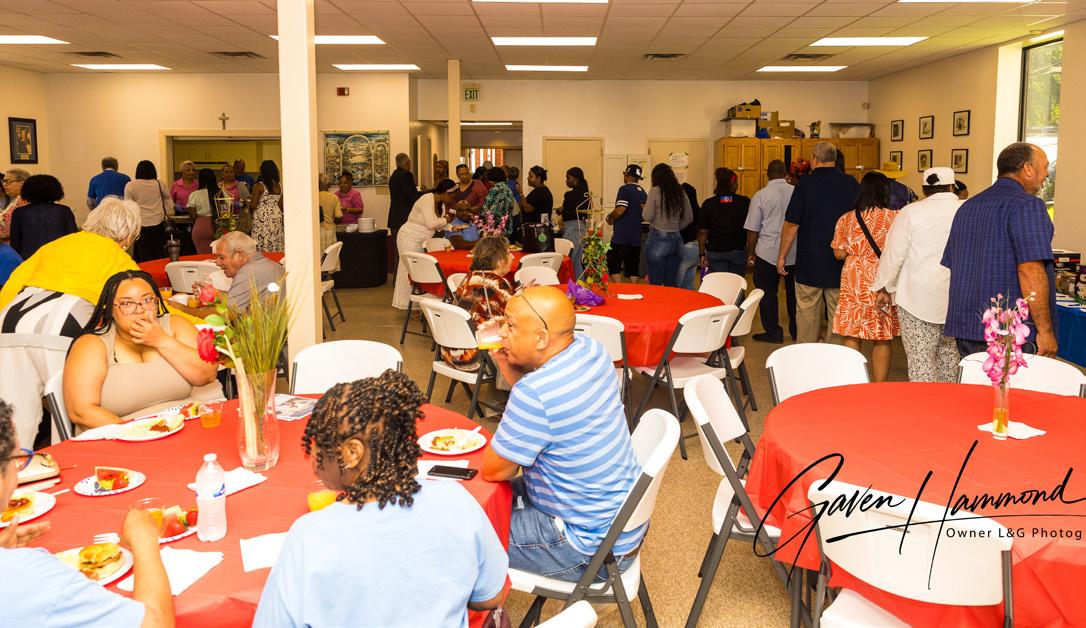
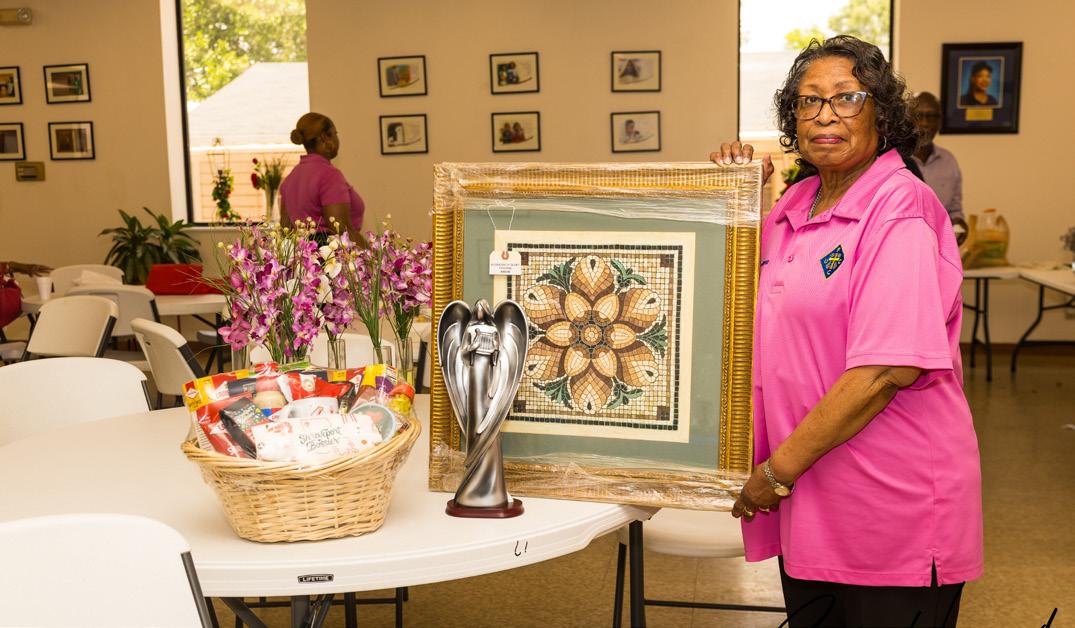
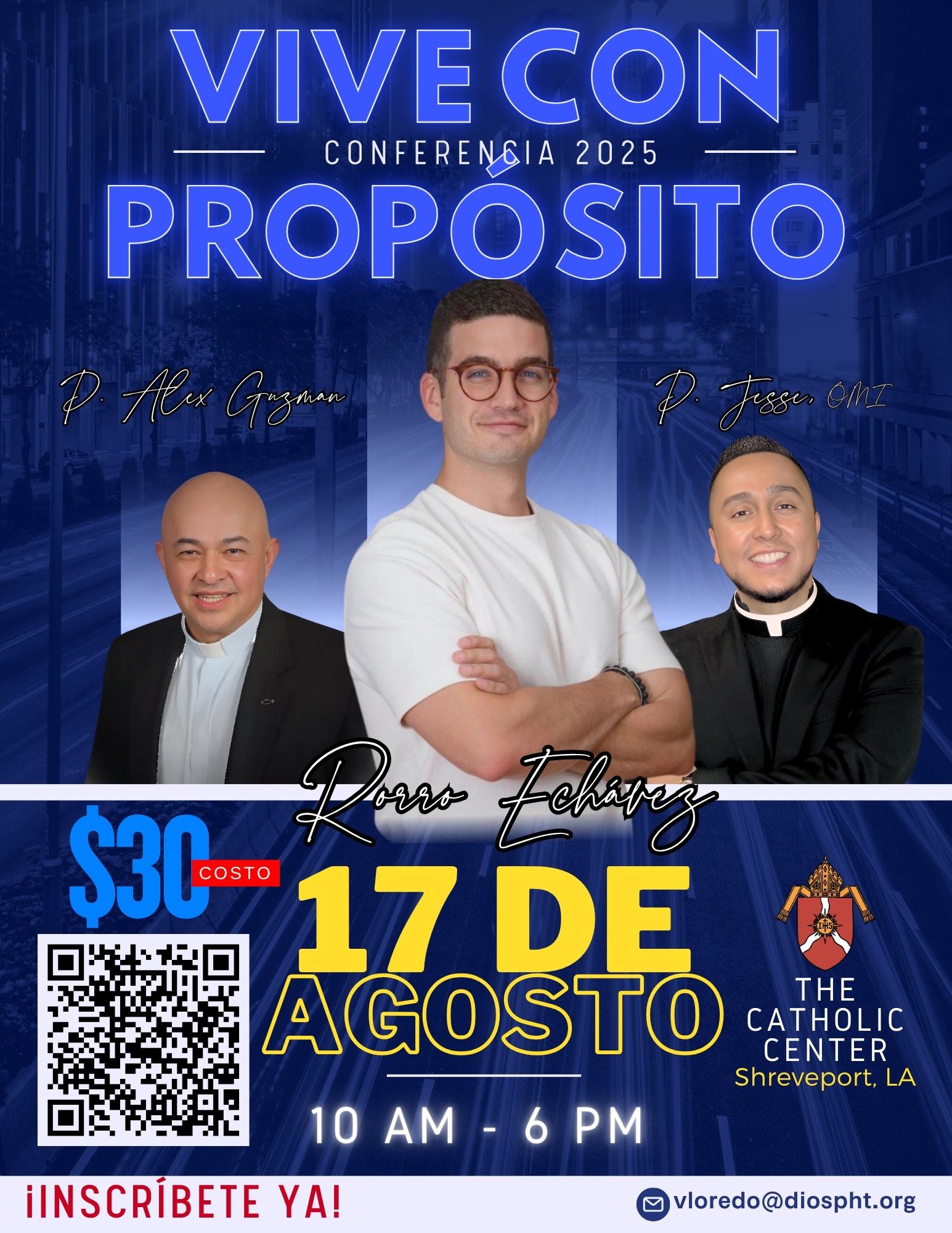





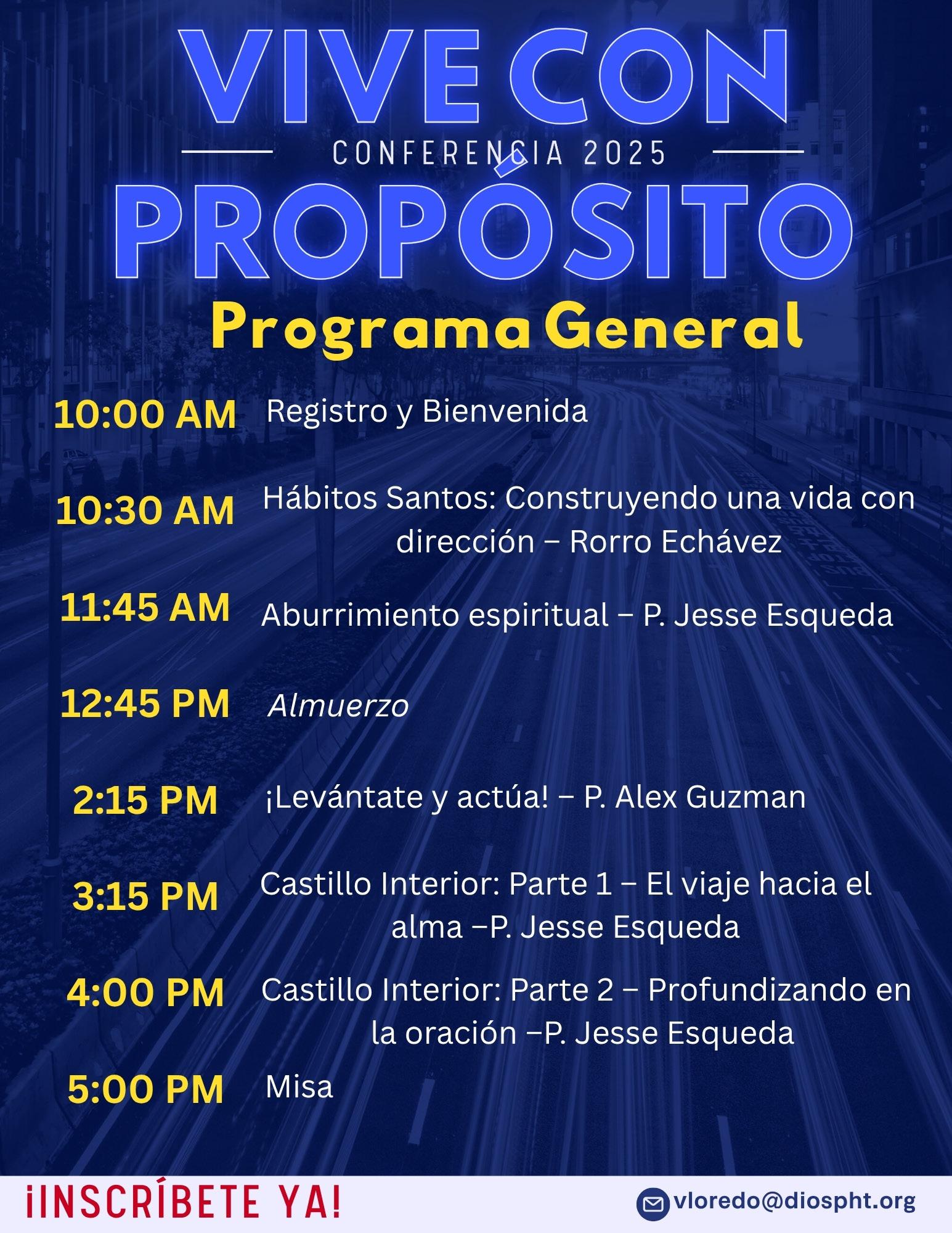
LOS PINOS
KC Auxiliary Breakfast at Our Lady of the Blessed Sacrament

Mary, Queen of Peace honored all the patriots who gave their lives for our freedom by placing the flags of all the armed forces around the American flag during the observance of Memorial Day.

On the Feast of the Visitation of the Blessed Virgin Mary, about 50 Vincentians gathered for a retreat led by Father Jerry Daigle, Jr., Pastor, St. Joseph Church, Shreveport. Father made a presentation on the life and spirituality of St. Vincent de Paul and wove these themes into the significance of the feast day.
At our Summer Intensive, August 4 - 7, you will get a taste of what it’s like to be a student at the Encounter School of Ministry, Shreveport Hybrid Campus.
What does “Summer Intensive” mean? The Summer Intensive is four evenings of encounter, encouragement, teaching, equipping, and activating where we will study Identity and Transformation, Hearing God’s Voice and the Prophetic Gifts of the Holy Spirit, Power Healing, and Inner Healing!
What does “Hybrid Campus” mean? Registered full-time students receive all lessons weekly (in video format from the Encounter School of Ministry Main Campus) along with materials for each school night directly into your email. You watch course content in your available time before we meet in person weekly for praise and worship, course review and activations!
Hundreds of priests and deacons have attended and graduated from the Encounter School of Ministry however, most students are lay Catholics. ESM is authentically Catholic, theologian reviewed to be free from moral or doctrinal error, accepted into the dioceses of four Cardinals and forth-eight Bishops and is expanding globally every year! https://encounterschool.org/approvals/
The school is not financially funded by the Dioceses of Shreveport in any way. We are convinced the Encounter School of Ministry is ideal for all Catholic Disciples of Jesus! Register for our Summer Intensive and then register to be a student. You won’t know unless you come and see!

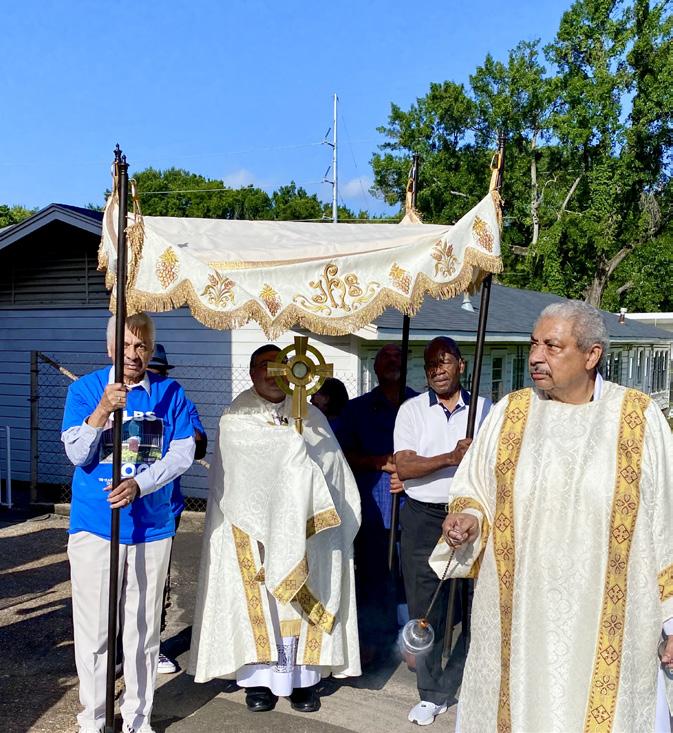
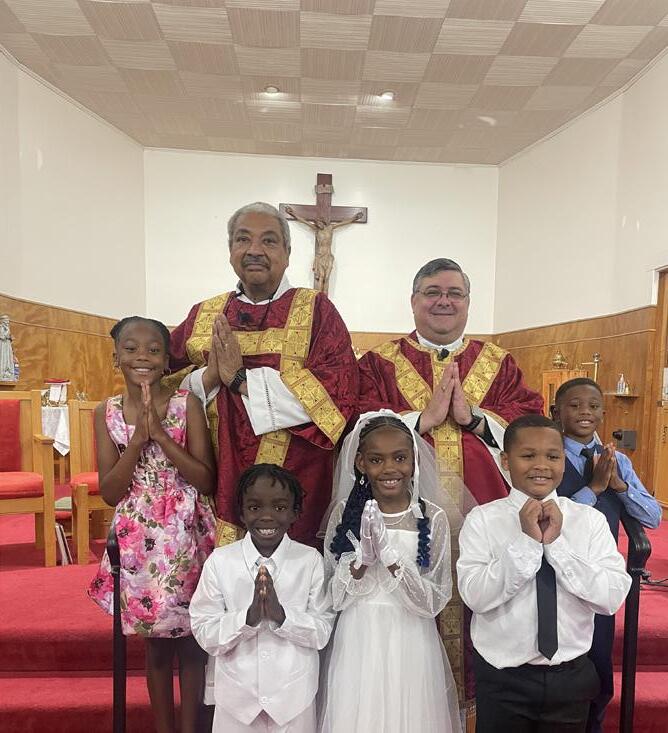
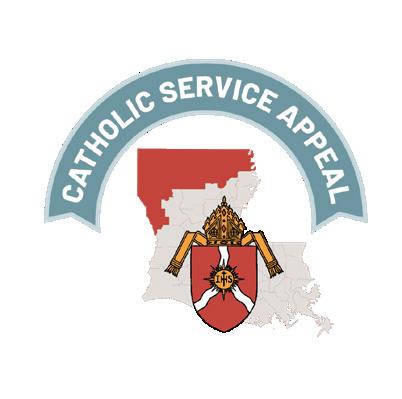


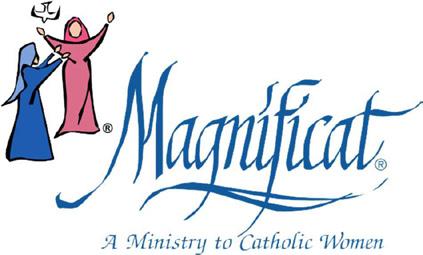




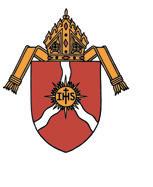
CATHOLIC CONNECTION
DIOCESE OF SHREVEPORT
3500 Fairfield Ave. • Shreveport, LA 71104
Catholic Connection USPS 024-824 is published monthly except for July by the Diocese of Shreveport, 3500 Fairfield Ave., Shreveport, LA 71104. Periodicals Postage PAID at Shreveport, LA 71102. POSTMASTER: Send address changes to Catholic Connection, 3500 Fairfield Ave, Shreveport, LA 71104.
